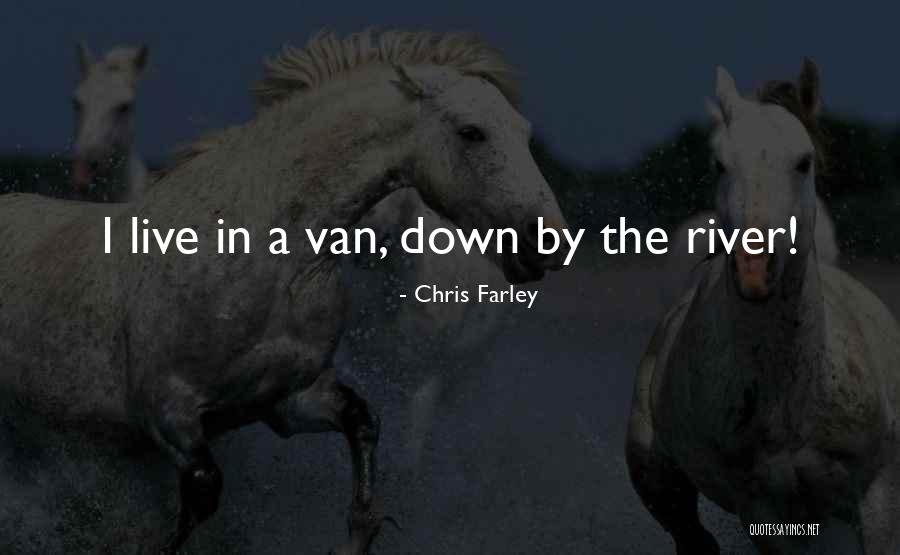Down By The River Quotes & Sayings
Enjoy reading and share 100 famous quotes about Down By The River with everyone.
Top Down By The River Quotes
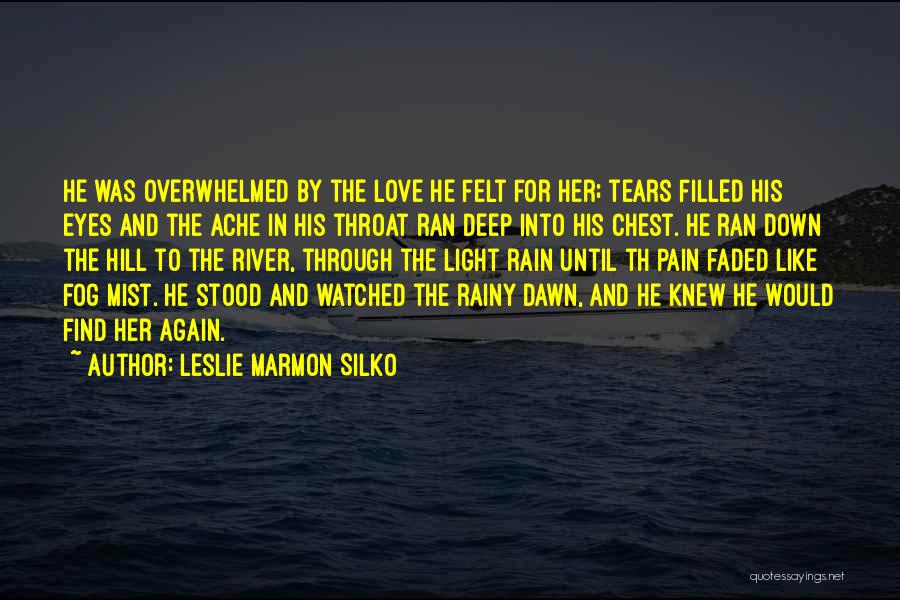
He was overwhelmed by the love he felt for her; tears filled his eyes and the ache in his throat ran deep into his chest. He ran down the hill to the river, through the light rain until th pain faded like fog mist. He stood and watched the rainy dawn, and he knew he would find her again. — Leslie Marmon Silko

She was still hugging the cat. "Poor slob," she said, tickling his head, "poor slob without a name. It's a little inconvenient, his not having a name. But I haven't any right to give him one: he'll have to wait until he belongs to somebody. We just sort of took up by the river one day, we don't belong to each other: he's an independent, and so am I. I don't want to own anything until I know I've found the place where me and things belong together. I'm not quite sure where that is just yet. But I know what it's like." She smiled, and let the cat drop to the floor. "It's like Tiffany's," she said.
[ ... ]
It calms me down right away, the quietness and the proud look of it; nothing very bad could happen to you there, not with those kind men in their nice suits, and that lovely smell of silver and alligator wallets. If I could find a real-life place that made me feel like Tiffany's, then I'd buy some furniture and give the cat a name. — Truman Capote
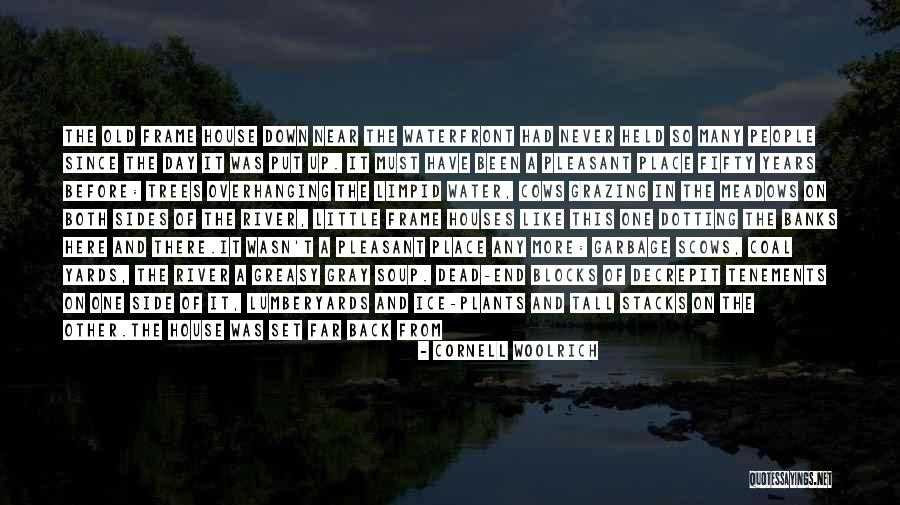
The old frame house down near the waterfront had never held so many people since the day it was put up. It must have been a pleasant place fifty years before: trees overhanging the limpid water, cows grazing in the meadows on both sides of the river, little frame houses like this one dotting the banks here and there.
It wasn't a pleasant place any more: garbage scows, coal yards, the river a greasy gray soup. Dead-end blocks of decrepit tenements on one side of it, lumberyards and ice-plants and tall stacks on the other.
The house was set far back from the street, hemmed in by the blank walls that rose around it.
("I Wouldn't Be In Your Shoes") — Cornell Woolrich
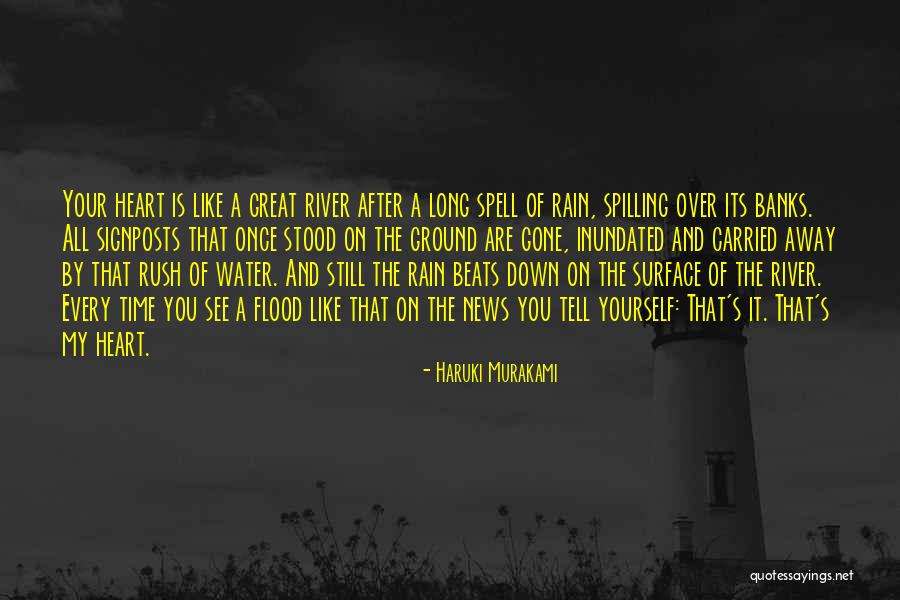
Your heart is like a great river after a long spell of rain, spilling over its banks. All signposts that once stood on the ground are gone, inundated and carried away by that rush of water. And still the rain beats down on the surface of the river. Every time you see a flood like that on the news you tell yourself: That's it. That's my heart. — Haruki Murakami
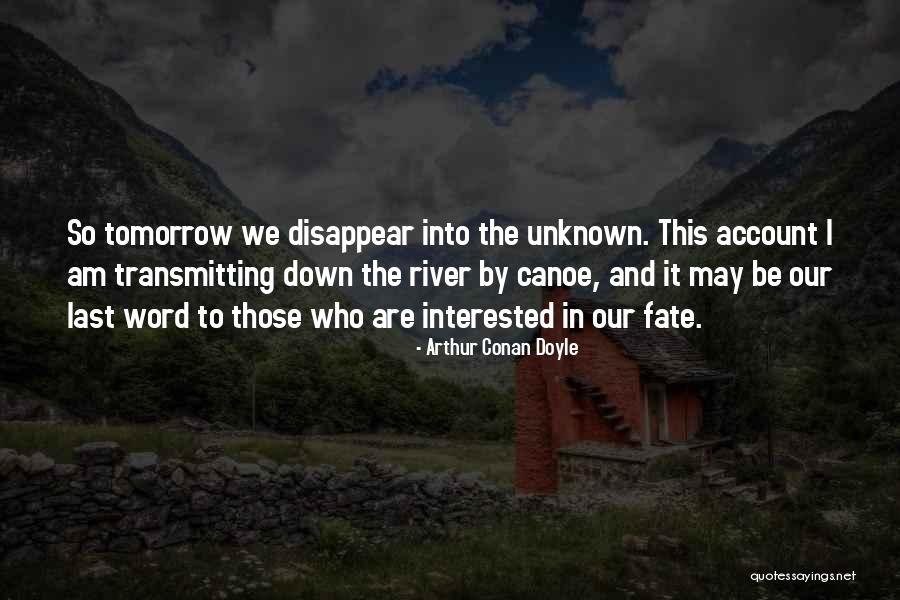
So tomorrow we disappear into the unknown. This account I am transmitting down the river by canoe, and it may be our last word to those who are interested in our fate. — Arthur Conan Doyle
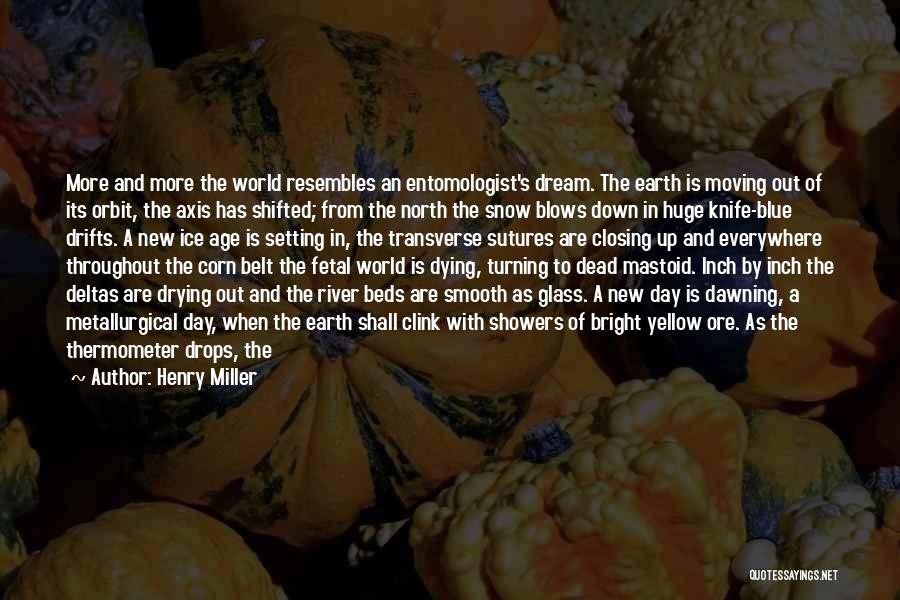
More and more the world resembles an entomologist's dream. The earth is moving out of its orbit, the axis has shifted; from the north the snow blows down in huge knife-blue drifts. A new ice age is setting in, the transverse sutures are closing up and everywhere throughout the corn belt the fetal world is dying, turning to dead mastoid. Inch by inch the deltas are drying out and the river beds are smooth as glass. A new day is dawning, a metallurgical day, when the earth shall clink with showers of bright yellow ore. As the thermometer drops, the form of the world grows blurred; osmosis there still is, and here and there articulation, but at the periphery the veins are all varicose, at the periphery the light waves bend and the sun bleeds like a broken rectum. — Henry Miller
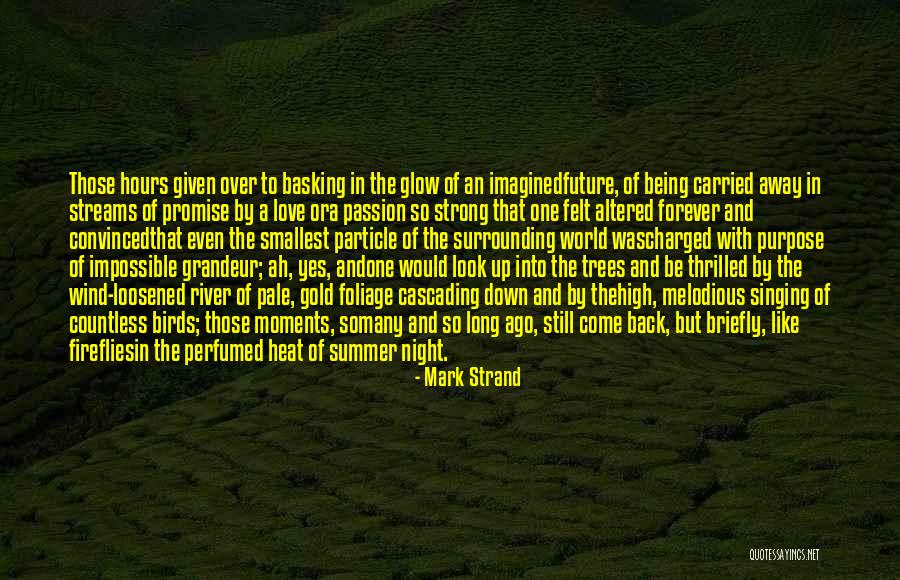
Those hours given over to basking in the glow of an imagined
future, of being carried away in streams of promise by a love or
a passion so strong that one felt altered forever and convinced
that even the smallest particle of the surrounding world was
charged with purpose of impossible grandeur; ah, yes, and
one would look up into the trees and be thrilled by the wind-
loosened river of pale, gold foliage cascading down and by the
high, melodious singing of countless birds; those moments, so
many and so long ago, still come back, but briefly, like fireflies
in the perfumed heat of summer night. — Mark Strand
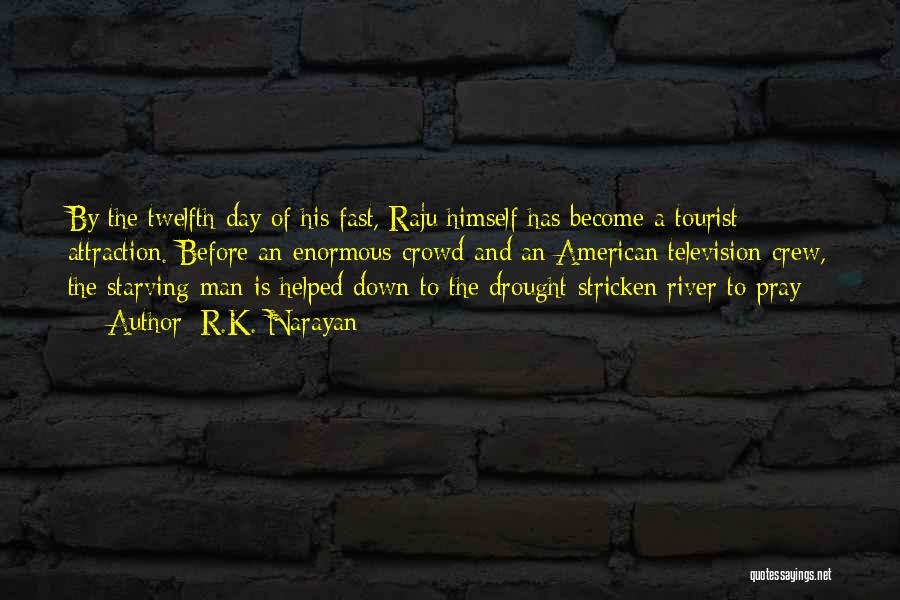
By the twelfth day of his fast, Raju himself has become a tourist attraction. Before an enormous crowd and an American television crew, the starving man is helped down to the drought-stricken river to pray: — R.K. Narayan
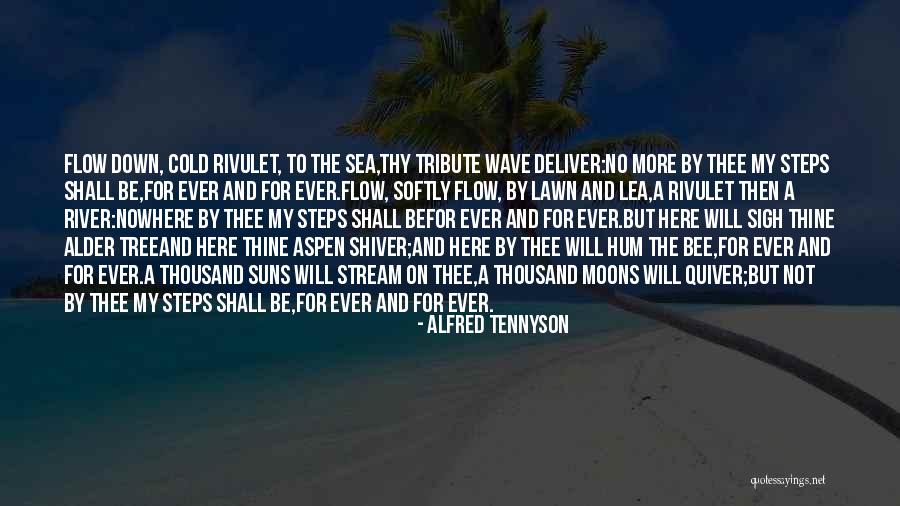
Flow down, cold rivulet, to the sea,
Thy tribute wave deliver:
No more by thee my steps shall be,
For ever and for ever.
Flow, softly flow, by lawn and lea,
A rivulet then a river:
Nowhere by thee my steps shall be
For ever and for ever.
But here will sigh thine alder tree
And here thine aspen shiver;
And here by thee will hum the bee,
For ever and for ever.
A thousand suns will stream on thee,
A thousand moons will quiver;
But not by thee my steps shall be,
For ever and for ever. — Alfred Tennyson

There Is A Place.
There is a place, I want to show you.
There is a place, just down the road.
There is a place, down by the river.
There is a place, that I call home...
There is a place, that I would play as a kid.
There is a place, that I would walk alone.
There is a place, and it's like a sad song.
There is a place, that is now long gone...
Here is a place, will you come see?
This is the place in my mind, I'd like to be.
Just open your mind, and think.
Is there a place, you would like to be? — Jerrel C. Thomas
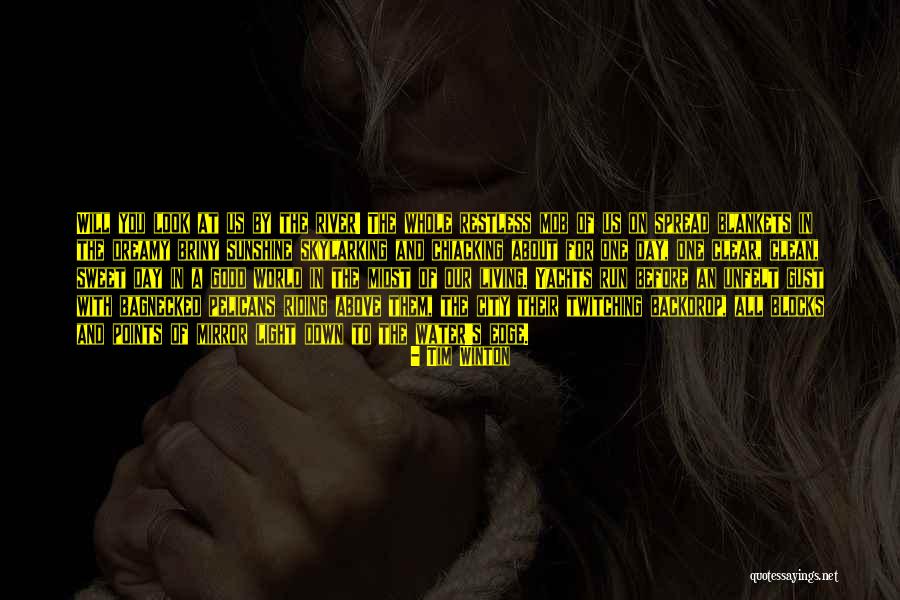
Will you look at us by the river! The whole restless mob of us on spread blankets in the dreamy briny sunshine skylarking and chiacking about for one day, one clear, clean, sweet day in a good world in the midst of our living. Yachts run before an unfelt gust with bagnecked pelicans riding above them, the city their twitching backdrop, all blocks and points of mirror light down to the water's edge. — Tim Winton
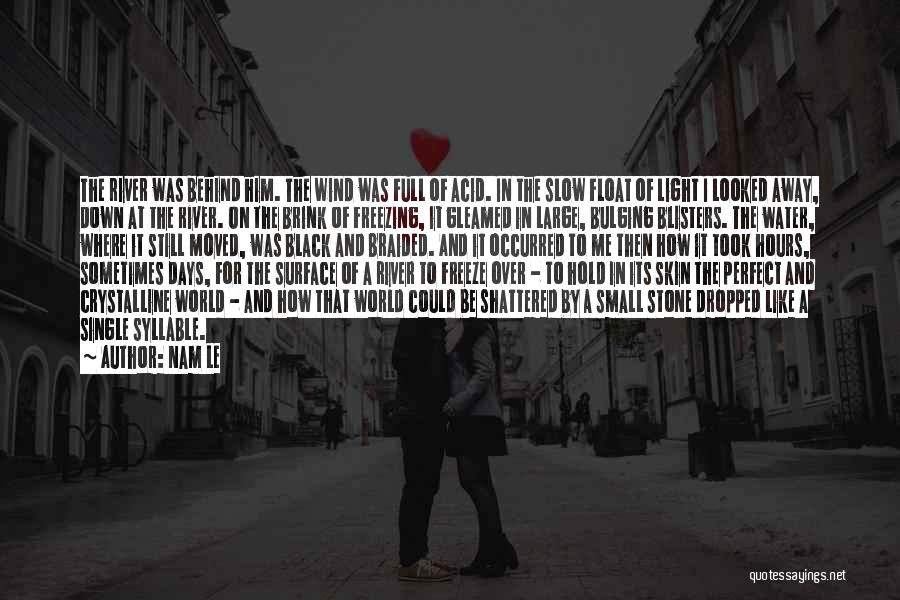
The river was behind him. The wind was full of acid. In the slow float of light I looked away, down at the river. On the brink of freezing, it gleamed in large, bulging blisters. The water, where it still moved, was black and braided. And it occurred to me then how it took hours, sometimes days, for the surface of a river to freeze over - to hold in its skin the perfect and crystalline world - and how that world could be shattered by a small stone dropped like a single syllable. — Nam Le
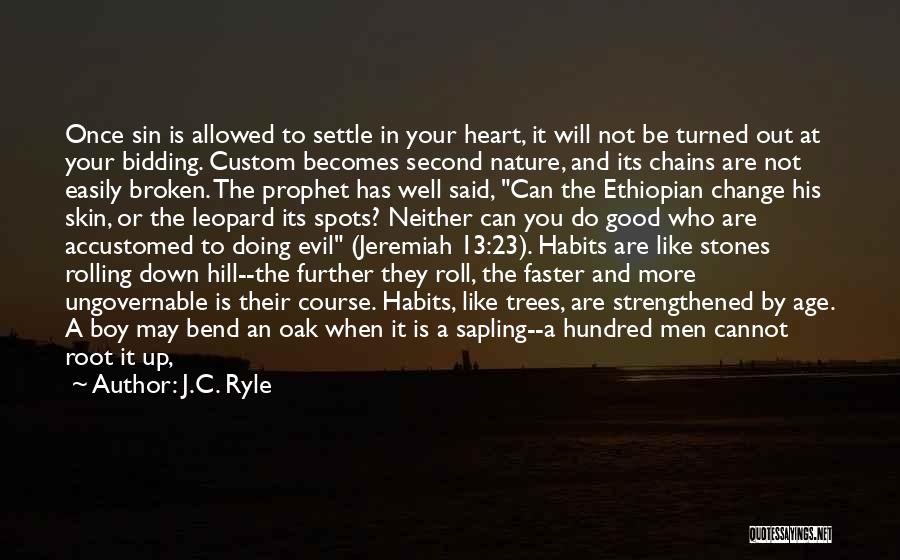
Once sin is allowed to settle in your heart, it will not be turned out at your bidding. Custom becomes second nature, and its chains are not easily broken. The prophet has well said, "Can the Ethiopian change his skin, or the leopard its spots? Neither can you do good who are accustomed to doing evil" (Jeremiah 13:23). Habits are like stones rolling down hill--the further they roll, the faster and more ungovernable is their course. Habits, like trees, are strengthened by age. A boy may bend an oak when it is a sapling--a hundred men cannot root it up, when it is a full grown tree. A child can wade over the Thames River at its fountain-head--the largest ship in the world can float in it when it gets near the sea. So it is with habits: the older the stronger--the longer they have held possession, the harder they will be to cast out. — J.C. Ryle
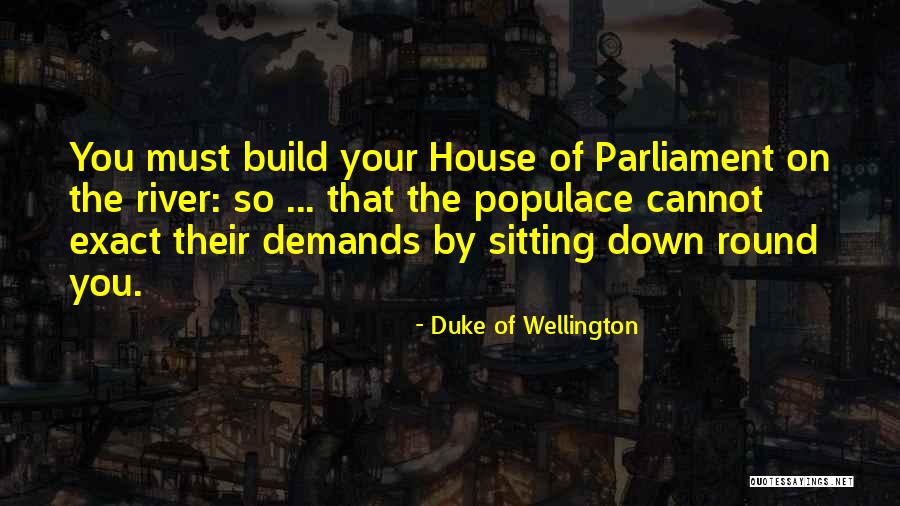
You must build your House of Parliament on the river: so ... that the populace cannot exact their demands by sitting down round you. — Duke Of Wellington
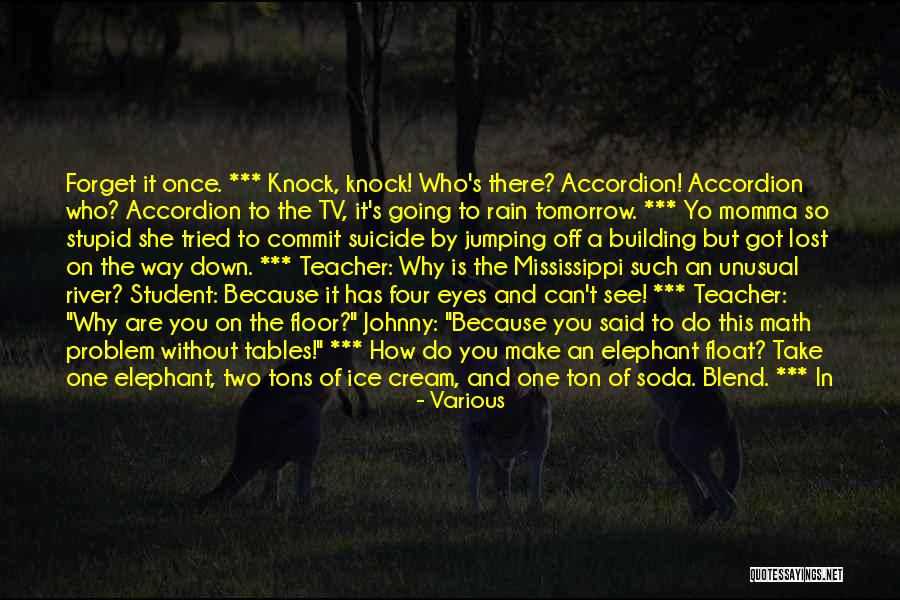
Forget it once. *** Knock, knock! Who's there? Accordion! Accordion who? Accordion to the TV, it's going to rain tomorrow. *** Yo momma so stupid she tried to commit suicide by jumping off a building but got lost on the way down. *** Teacher: Why is the Mississippi such an unusual river? Student: Because it has four eyes and can't see! *** Teacher: "Why are you on the floor?" Johnny: "Because you said to do this math problem without tables!" *** How do you make an elephant float? Take one elephant, two tons of ice cream, and one ton of soda. Blend. *** In — Various
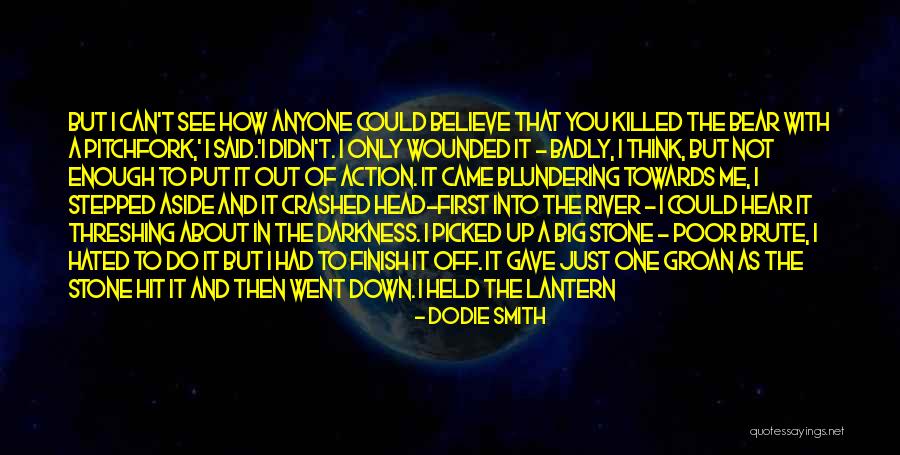
But I can't see how anyone could believe that you killed the bear with a pitchfork,' I said.
'I didn't. I only wounded it - badly, I think, but not enough to put it out of action. It came blundering towards me, I stepped aside and it crashed head-first into the river - I could hear it threshing about in the darkness. I picked up a big stone - poor brute, I hated to do it but I had to finish it off. It gave just one groan as the stone hit it and then went down. I held the lantern high; I could see the bubbles coming up. And then I saw the dark bulk of it under the water, being carried along by the current.'
'But you didn't have a lantern,' I said.
'He didn't have a bear,' said Topaz. — Dodie Smith
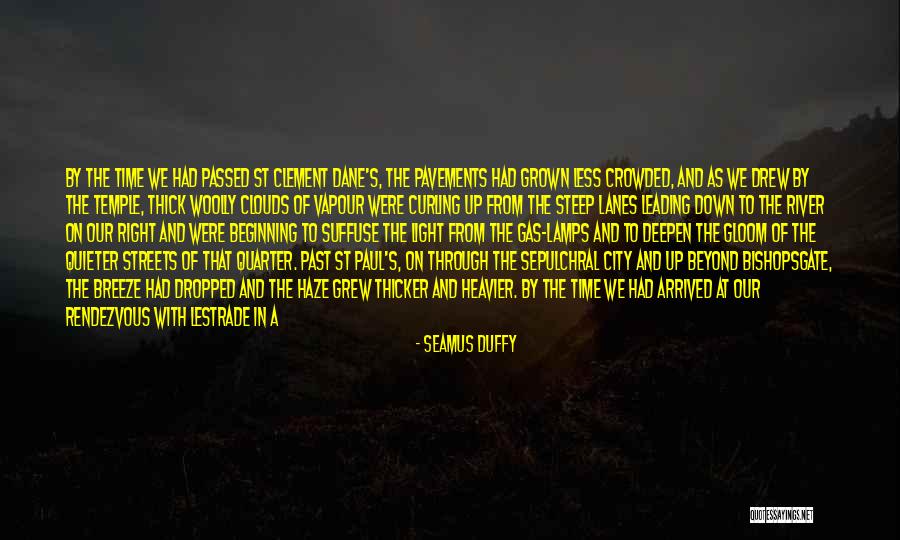
By the time we had passed St Clement Dane's, the pavements had grown less crowded, and as we drew by the Temple, thick woolly clouds of vapour were curling up from the steep lanes leading down to the river on our right and were beginning to suffuse the light from the gas-lamps and to deepen the gloom of the quieter streets of that quarter. Past St Paul's, on through the sepulchral City and up beyond Bishopsgate, the breeze had dropped and the haze grew thicker and heavier. By the time we had arrived at our rendezvous with Lestrade in a warren of dismal backstreets in Spitalfields, we were mired in the drab wraiths of a summer fog. — Seamus Duffy
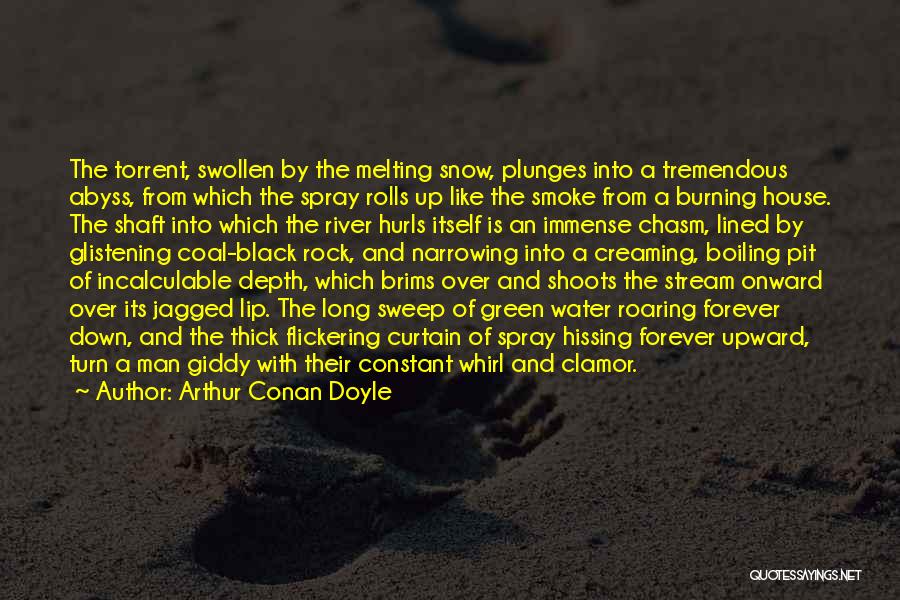
The torrent, swollen by the melting snow, plunges into a tremendous abyss, from which the spray rolls up like the smoke from a burning house. The shaft into which the river hurls itself is an immense chasm, lined by glistening coal-black rock, and narrowing into a creaming, boiling pit of incalculable depth, which brims over and shoots the stream onward over its jagged lip. The long sweep of green water roaring forever down, and the thick flickering curtain of spray hissing forever upward, turn a man giddy with their constant whirl and clamor. — Arthur Conan Doyle
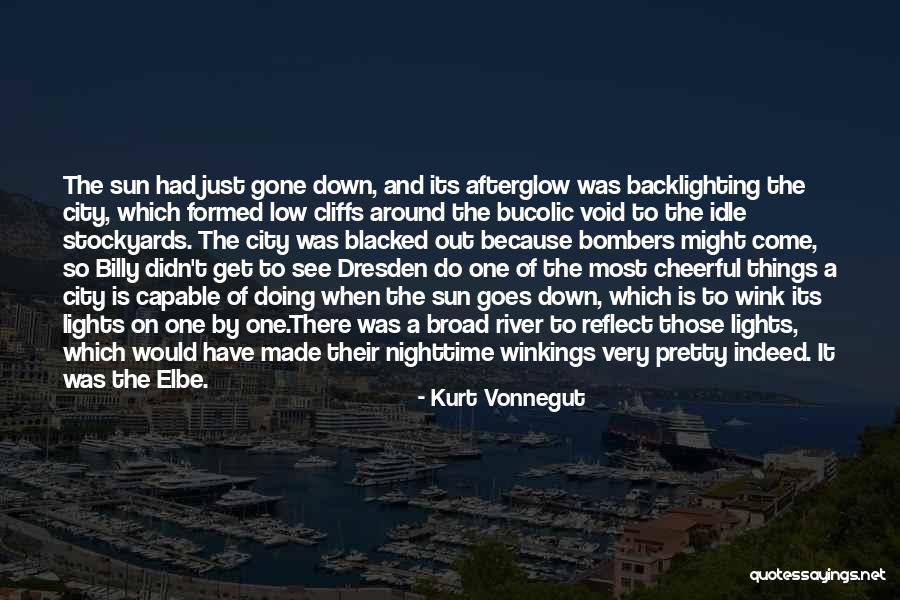
The sun had just gone down, and its afterglow was backlighting the city, which formed low cliffs around the bucolic void to the idle stockyards. The city was blacked out because bombers might come, so Billy didn't get to see Dresden do one of the most cheerful things a city is capable of doing when the sun goes down, which is to wink its lights on one by one.
There was a broad river to reflect those lights, which would have made their nighttime winkings very pretty indeed. It was the Elbe. — Kurt Vonnegut
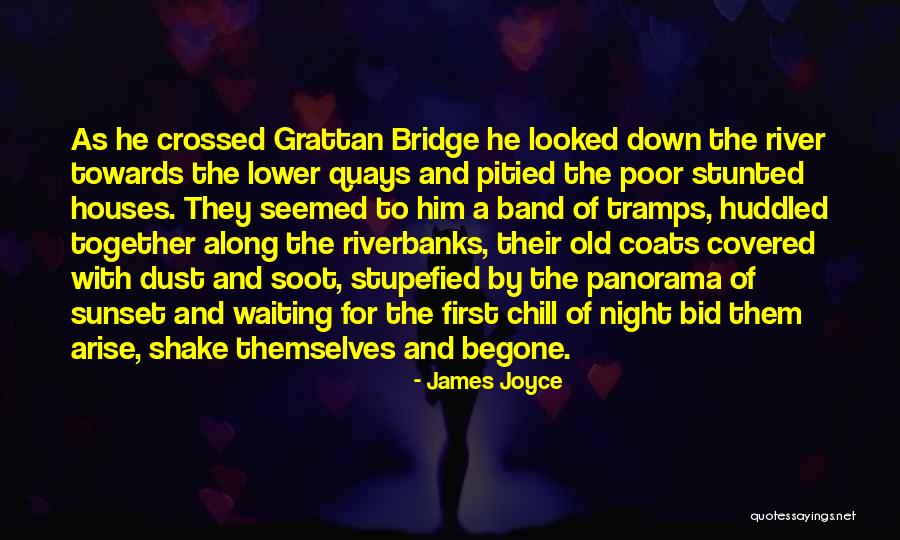
As he crossed Grattan Bridge he looked down the river towards the lower quays and pitied the poor stunted houses. They seemed to him a band of tramps, huddled together along the riverbanks, their old coats covered with dust and soot, stupefied by the panorama of sunset and waiting for the first chill of night bid them arise, shake themselves and begone. — James Joyce
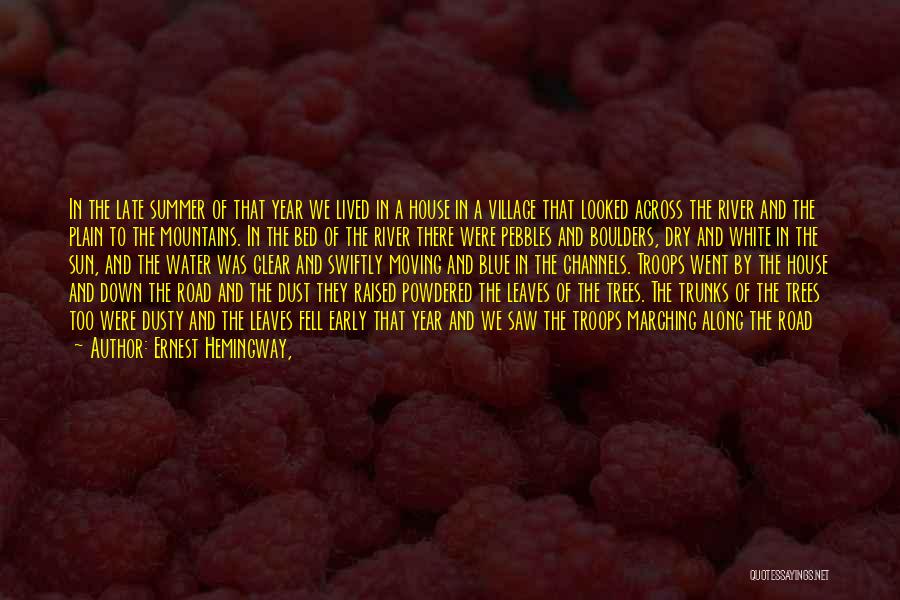
In the late summer of that year we lived in a house in a village that looked across the river and the plain to the mountains. In the bed of the river there were pebbles and boulders, dry and white in the sun, and the water was clear and swiftly moving and blue in the channels. Troops went by the house and down the road and the dust they raised powdered the leaves of the trees. The trunks of the trees too were dusty and the leaves fell early that year and we saw the troops marching along the road and the dust rising and leaves, stirred by the breeze, falling and the soldiers marching and afterward the road bare and white except for the leaves. — Ernest Hemingway,

From Kathmandu there is a road through Gorkha Country to Pokhara, in the central foothills; farther west, no roads exist at all. The road winds through steep gorges of the Trisuli River, now in torrent; dirty whitecaps filled the rapids, and the brown flood was thickened every now and again by thunderous rockslides down the walls of the ravine. — Peter Matthiessen
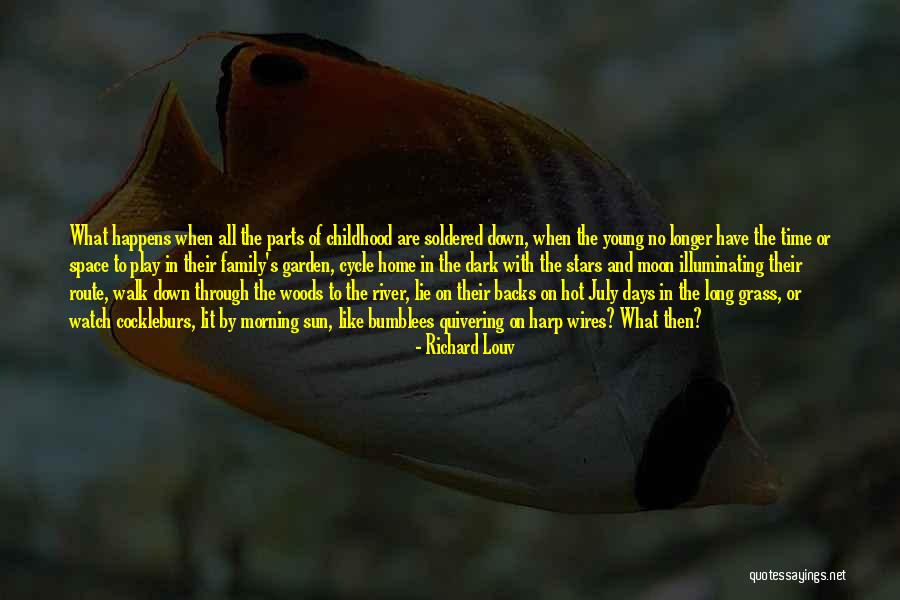
What happens when all the parts of childhood are soldered down, when the young no longer have the time or space to play in their family's garden, cycle home in the dark with the stars and moon illuminating their route, walk down through the woods to the river, lie on their backs on hot July days in the long grass, or watch cockleburs, lit by morning sun, like bumblees quivering on harp wires? What then? — Richard Louv

I'd love to be able to tell you a story about the future, but I'd rather tell you a story that counts. I'd rather give you a sense of where you might come from, because you need to know where you've been to know where to go. The future is your story to tell. And maybe you have more options for the future than you thought. Maybe there are different ways to see what comes next. Wear your iron goggles and walk down Dark Lane at night to see what you can see. Stand by the weir and look at the river of time. Understand that you are part of something very old and yet constantly renewed. And that you may think you can forget history, but history will certainly not forget you. We all need a cunning plan. So be cunning. — Warren Ellis
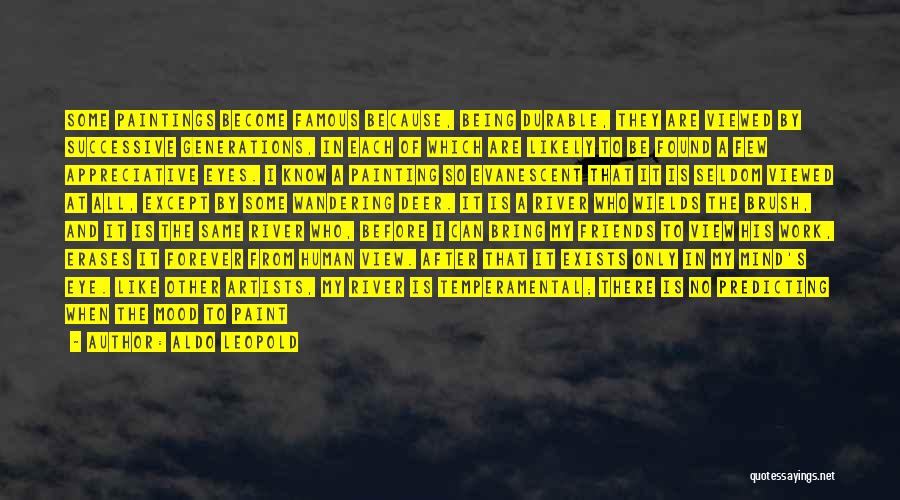
Some paintings become famous because, being durable, they are viewed by successive generations, in each of which are likely to be found a few appreciative eyes.
I know a painting so evanescent that it is seldom viewed at all, except by some wandering deer. It is a river who wields the brush, and it is the same river who, before I can bring my friends to view his work, erases it forever from human view. After that it exists only in my mind's eye.
Like other artists, my river is temperamental; there is no predicting when the mood to paint will come upon him, or how long it will last. But in midsummer, when the great white fleets cruise the sky for day after flawless day, it is worth strolling down to the sandbars just to see whether he has been at work. — Aldo Leopold
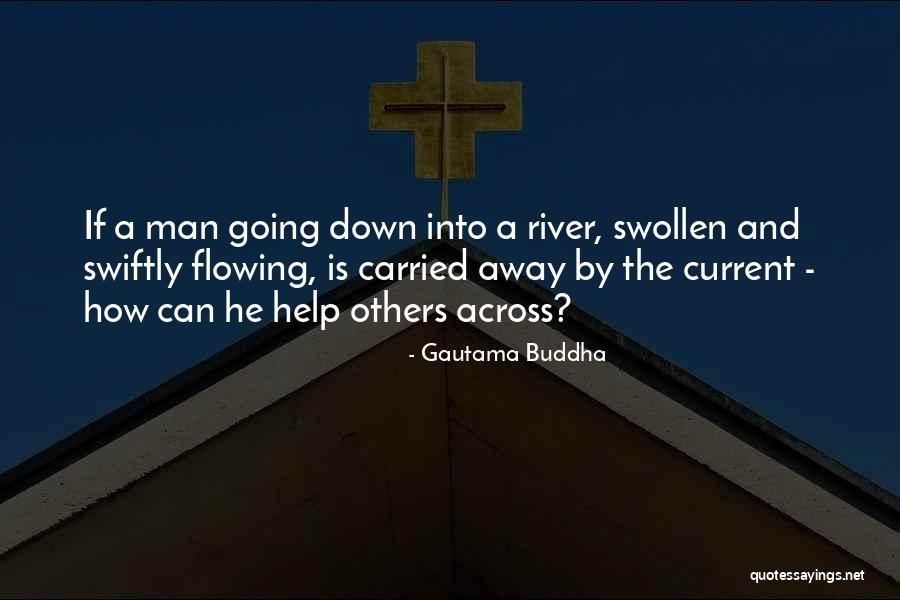
If a man going down into a river, swollen and swiftly flowing, is carried away by the current - how can he help others across? — Gautama Buddha
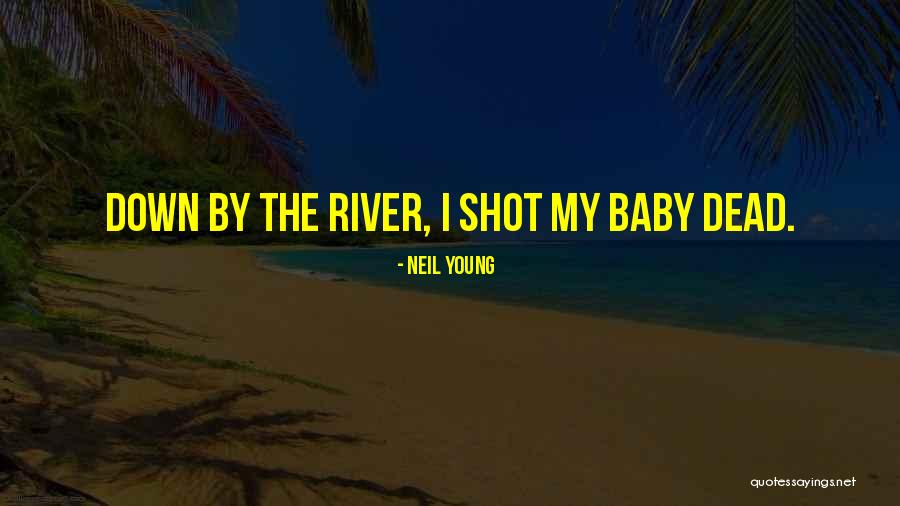
Down by the river, I shot my baby dead. — Neil Young
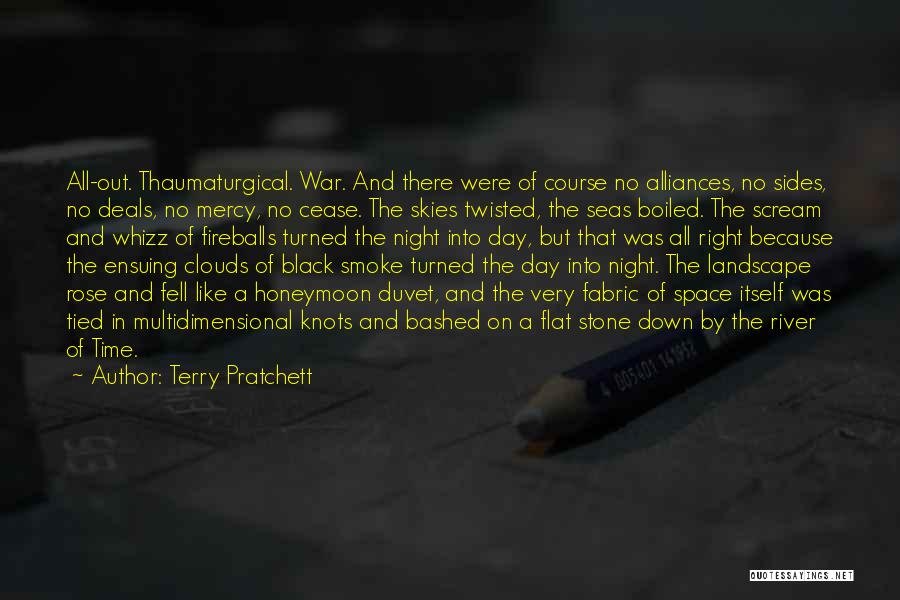
All-out. Thaumaturgical. War. And there were of course no alliances, no sides, no deals, no mercy, no cease. The skies twisted, the seas boiled. The scream and whizz of fireballs turned the night into day, but that was all right because the ensuing clouds of black smoke turned the day into night. The landscape rose and fell like a honeymoon duvet, and the very fabric of space itself was tied in multidimensional knots and bashed on a flat stone down by the river of Time. — Terry Pratchett
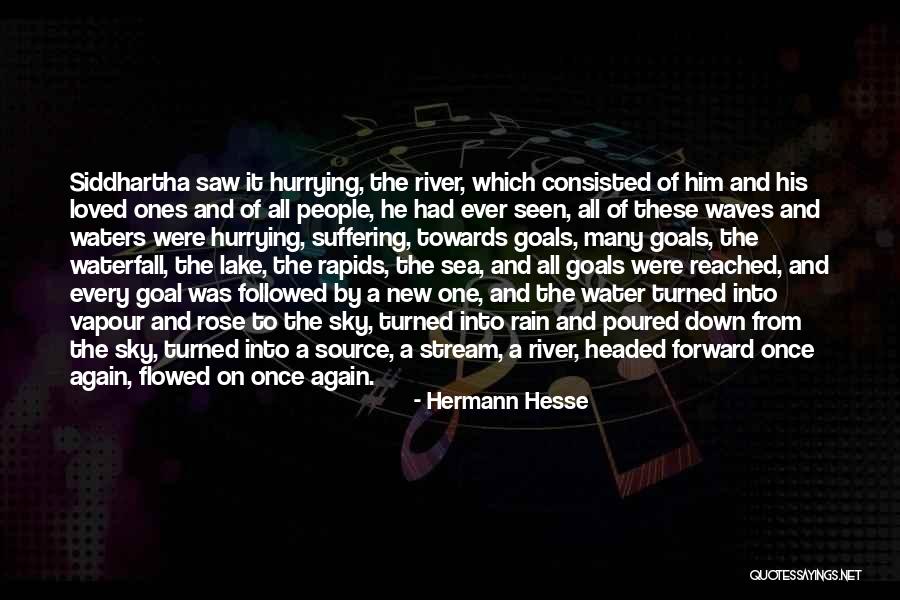
Siddhartha saw it hurrying, the river, which consisted of him and his loved ones and of all people, he had ever seen, all of these waves and waters were hurrying, suffering, towards goals, many goals, the waterfall, the lake, the rapids, the sea, and all goals were reached, and every goal was followed by a new one, and the water turned into vapour and rose to the sky, turned into rain and poured down from the sky, turned into a source, a stream, a river, headed forward once again, flowed on once again. — Hermann Hesse
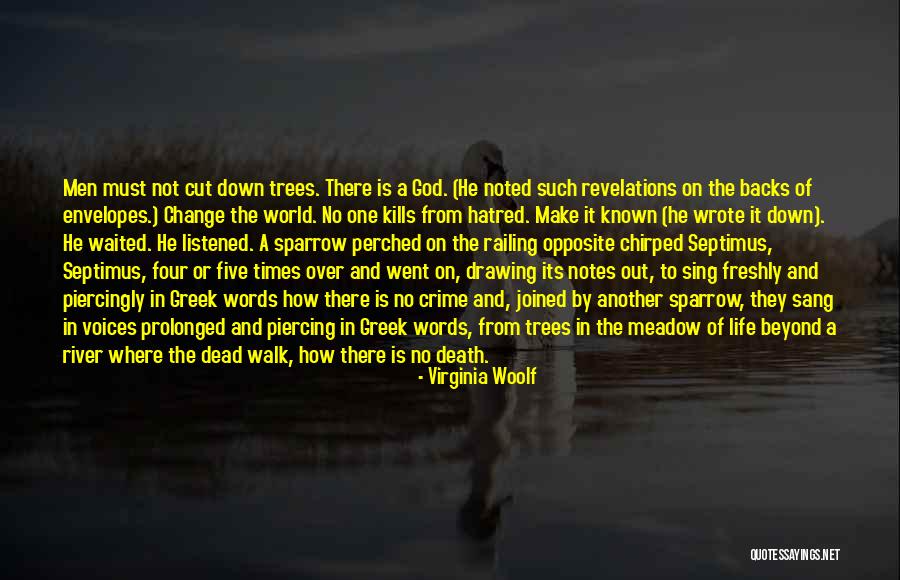
Men must not cut down trees. There is a God. (He noted such revelations on the backs of envelopes.) Change the world. No one kills from hatred. Make it known (he wrote it down). He waited. He listened. A sparrow perched on the railing opposite chirped Septimus, Septimus, four or five times over and went on, drawing its notes out, to sing freshly and piercingly in Greek words how there is no crime and, joined by another sparrow, they sang in voices prolonged and piercing in Greek words, from trees in the meadow of life beyond a river where the dead walk, how there is no death. — Virginia Woolf
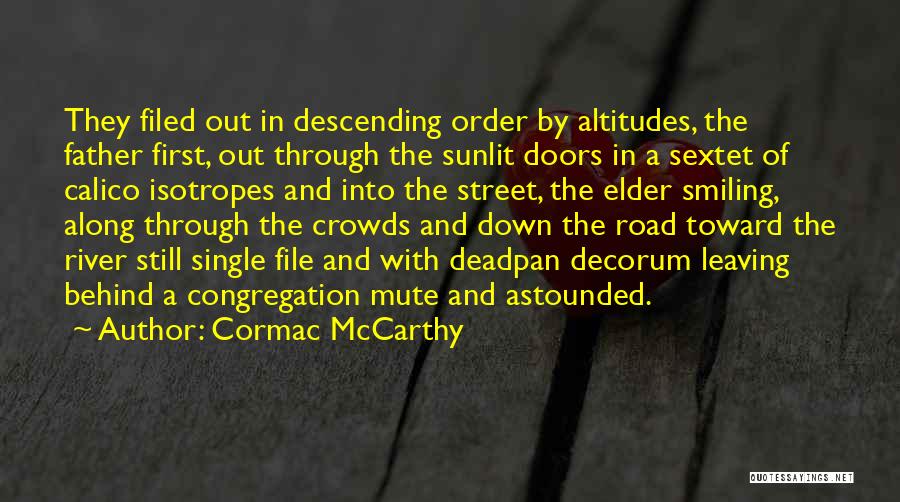
They filed out in descending order by altitudes, the father first, out through the sunlit doors in a sextet of calico isotropes and into the street, the elder smiling, along through the crowds and down the road toward the river still single file and with deadpan decorum leaving behind a congregation mute and astounded. — Cormac McCarthy
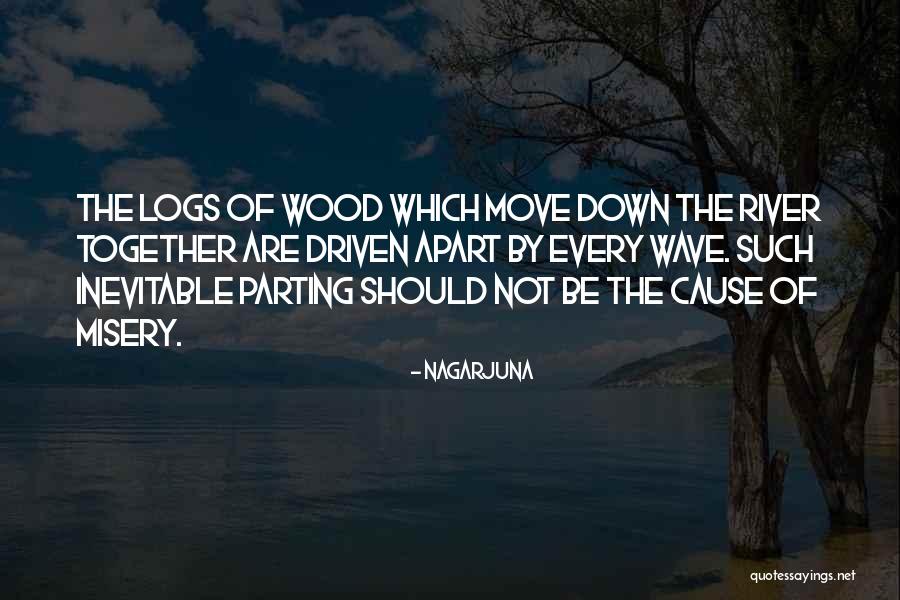
The logs of wood which move down the river together Are driven apart by every wave. Such inevitable parting Should not be the cause of misery. — Nagarjuna
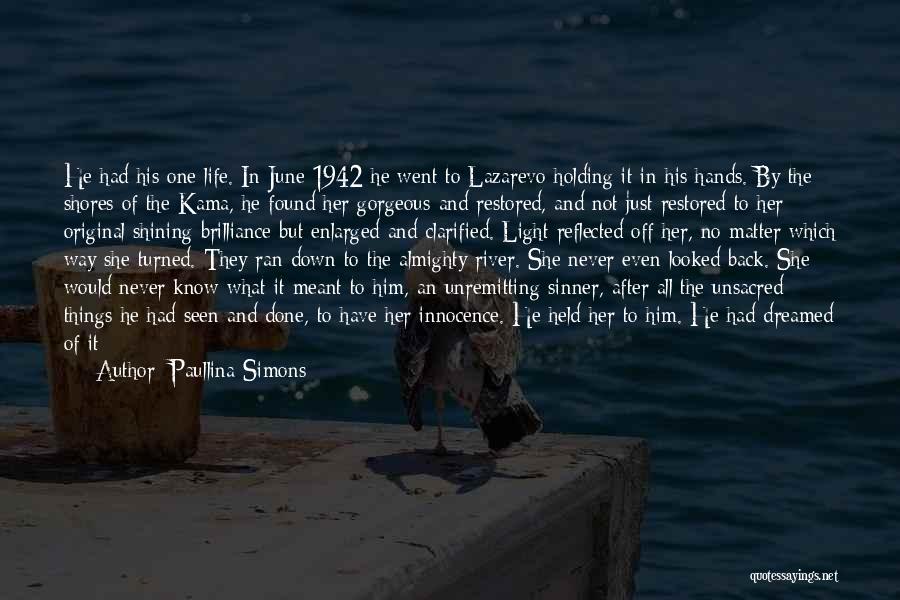
He had his one life. In June 1942 he went to Lazarevo holding it in his hands. By the shores of the Kama, he found her gorgeous and restored, and not just restored to her original shining brilliance but enlarged and clarified. Light reflected off her, no matter which way she turned. They ran down to the almighty river. She never even looked back. She would never know what it meant to him, an unremitting sinner, after all the unsacred things he had seen and done, to have her innocence. He held her to him. He had dreamed of it too long, touching her. Dreamed of seeing her naked too long, beautiful, bare, ready for him. He was afraid to hurt her. He had never been with an untouched girl before; he wasn't sure if he was supposed to do something first. In the end, he did nothing first, but she baptized him with her body. There was no Alexander anymore; the man he knew had died and was reborn inside a perfect heart, given to him straight from God, to him and for him. — Paullina Simons
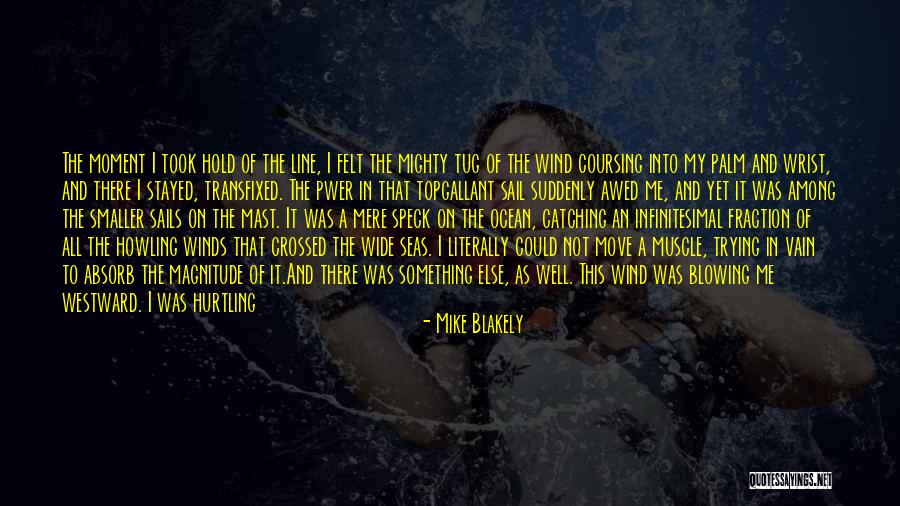
The moment I took hold of the line, I felt the mighty tug of the wind coursing into my palm and wrist, and there I stayed, transfixed. The pwer in that topgallant sail suddenly awed me, and yet it was among the smaller sails on the mast. It was a mere speck on the ocean, catching an infinitesimal fraction of all the howling winds that crossed the wide seas. I literally could not move a muscle, trying in vain to absorb the magnitude of it.
And there was something else, as well. This wind was blowing me westward. I was hurtling into my own predestined future. With neither star nor compass, I knew the heading of this wind. It bore down on a lonely river crossing in one of the last wild places on Earth, where timber moaned in a gale, and frosty grass sparkled in the dawn, and beasts lumbered and thundered the valley. A sacred place protected by Comanches. — Mike Blakely
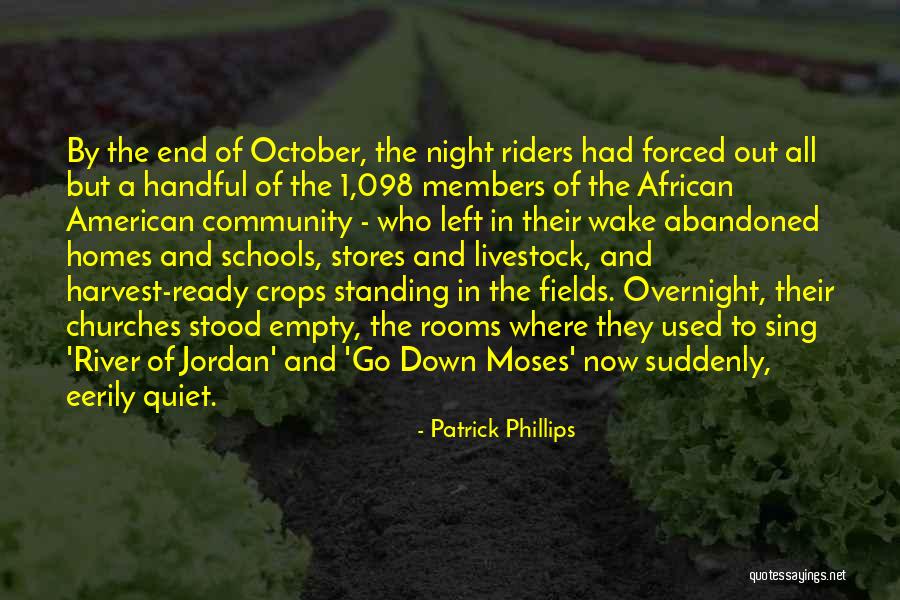
By the end of October, the night riders had forced out all but a handful of the 1,098 members of the African American community - who left in their wake abandoned homes and schools, stores and livestock, and harvest-ready crops standing in the fields. Overnight, their churches stood empty, the rooms where they used to sing 'River of Jordan' and 'Go Down Moses' now suddenly, eerily quiet. — Patrick Phillips
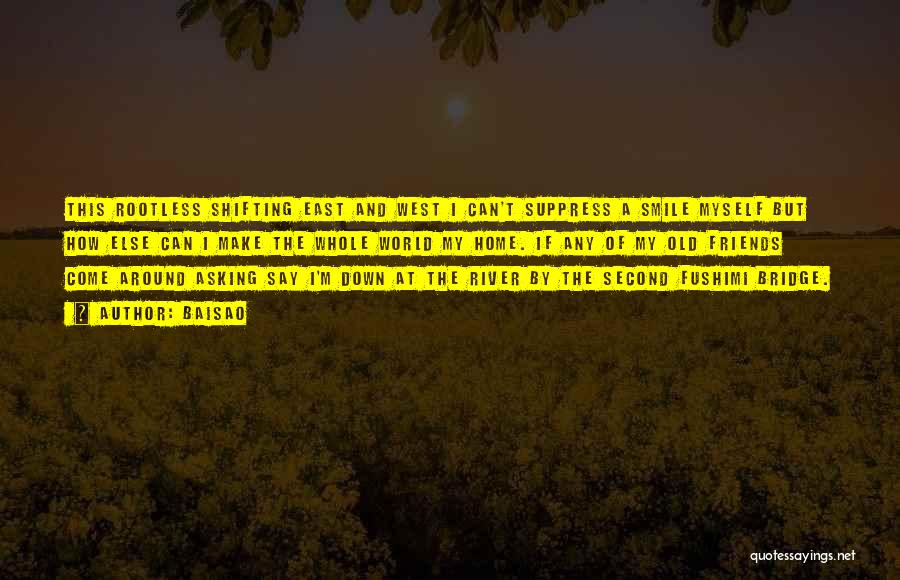
This rootless shifting east and west
I can't suppress a smile myself
but how else can I make
the whole world my home.
If any of my old friends
come around asking
say I'm down at the river
by the Second Fushimi Bridge. — Baisao
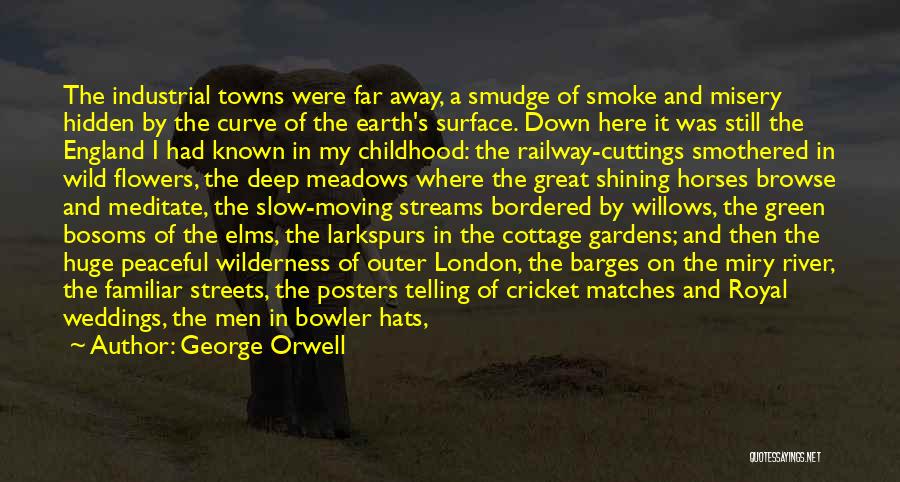
The industrial towns were far away, a smudge of smoke and misery hidden by the curve of the earth's surface. Down here it was still the England I had known in my childhood: the railway-cuttings smothered in wild flowers, the deep meadows where the great shining horses browse and meditate, the slow-moving streams bordered by willows, the green bosoms of the elms, the larkspurs in the cottage gardens; and then the huge peaceful wilderness of outer London, the barges on the miry river, the familiar streets, the posters telling of cricket matches and Royal weddings, the men in bowler hats, the pigeons in Trafalgar Square, the red buses, the blue policemen - all sleeping the deep, deep sleep of England, from which I sometimes fear that we shall never wake till we are jerked out of it by the roar of bombs. — George Orwell
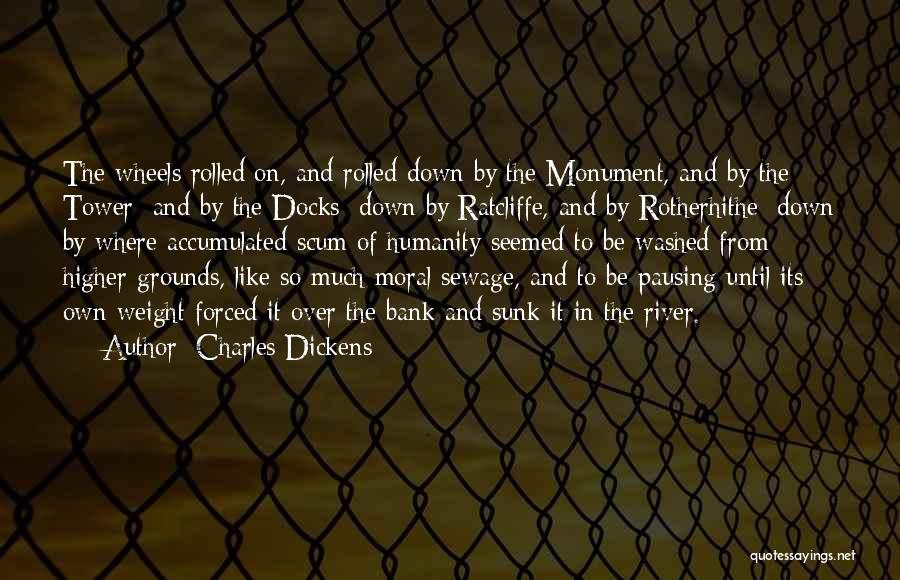
The wheels rolled on, and rolled down by the Monument, and by the Tower; and by the Docks; down by Ratcliffe, and by Rotherhithe; down by where accumulated scum of humanity seemed to be washed from higher grounds, like so much moral sewage, and to be pausing until its own weight forced it over the bank and sunk it in the river. — Charles Dickens
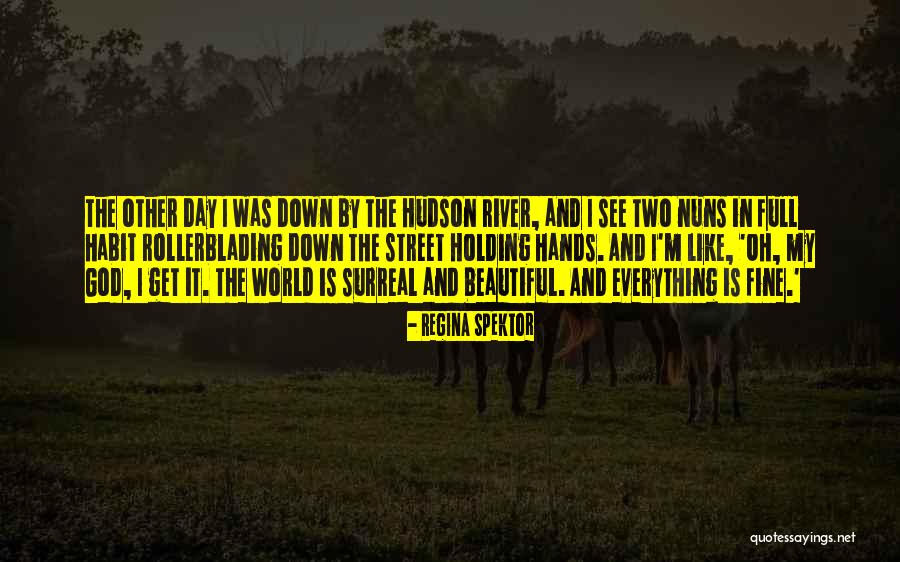
The other day I was down by the Hudson River, and I see two nuns in full habit rollerblading down the street holding hands. And I'm like, 'Oh, my God, I get it. The world is surreal and beautiful. And everything is fine.' — Regina Spektor
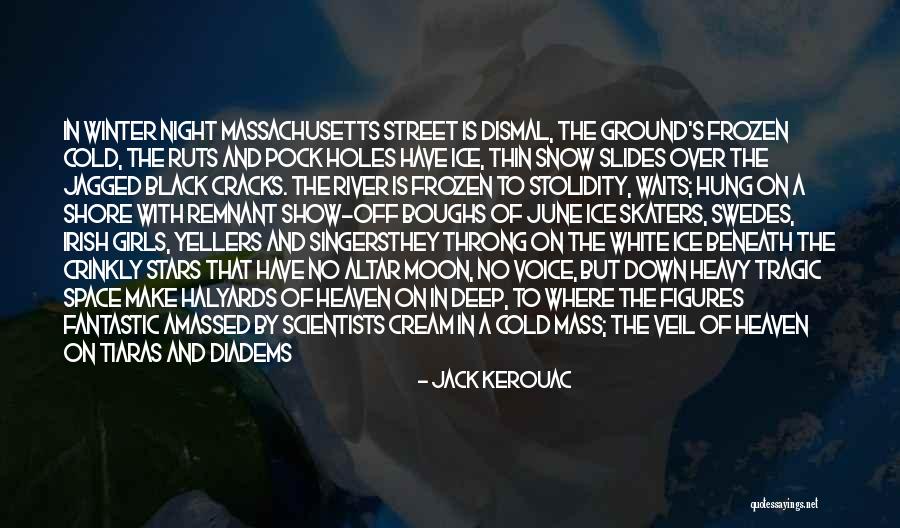
In winter night Massachusetts Street is dismal, the ground's frozen cold, the ruts and pock holes have ice, thin snow slides over the jagged black cracks. The river is frozen to stolidity, waits; hung on a shore with remnant show-off boughs of June
Ice skaters, Swedes, Irish girls, yellers and singers
they throng on the white ice beneath the crinkly stars that have no altar moon, no voice, but down heavy tragic space make halyards of Heaven on in deep, to where the figures fantastic amassed by scientists cream in a cold mass; the veil of Heaven on tiaras and diadems of a great Eternity Brunette called night. — Jack Kerouac
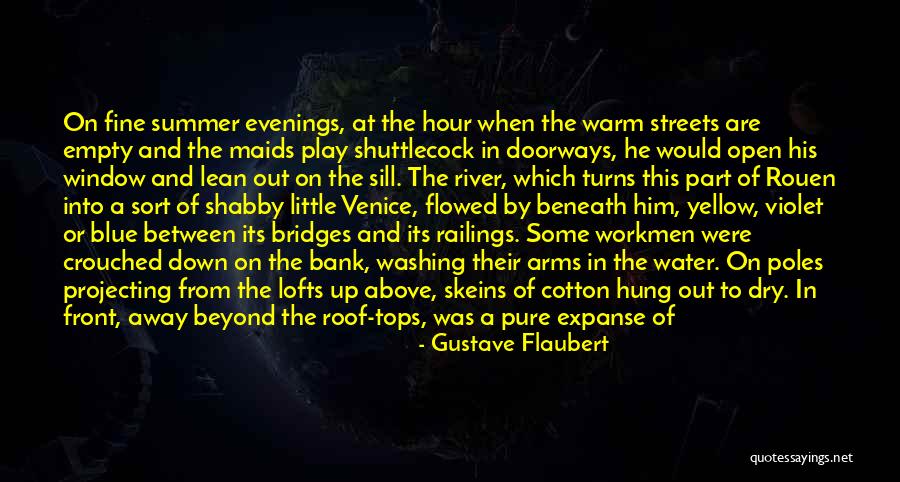
On fine summer evenings, at the hour when the warm streets are empty and the maids play shuttlecock in doorways, he would open his window and lean out on the sill. The river, which turns this part of Rouen into a sort of shabby little Venice, flowed by beneath him, yellow, violet or blue between its bridges and its railings. Some workmen were crouched down on the bank, washing their arms in the water. On poles projecting from the lofts up above, skeins of cotton hung out to dry. In front, away beyond the roof-tops, was a pure expanse of sky with a red sun setting. How good it would be over yonder, now! How cool under the beeches! He opened his nostrils to breathe in the wholesome country smells - which failed to reach him here. — Gustave Flaubert
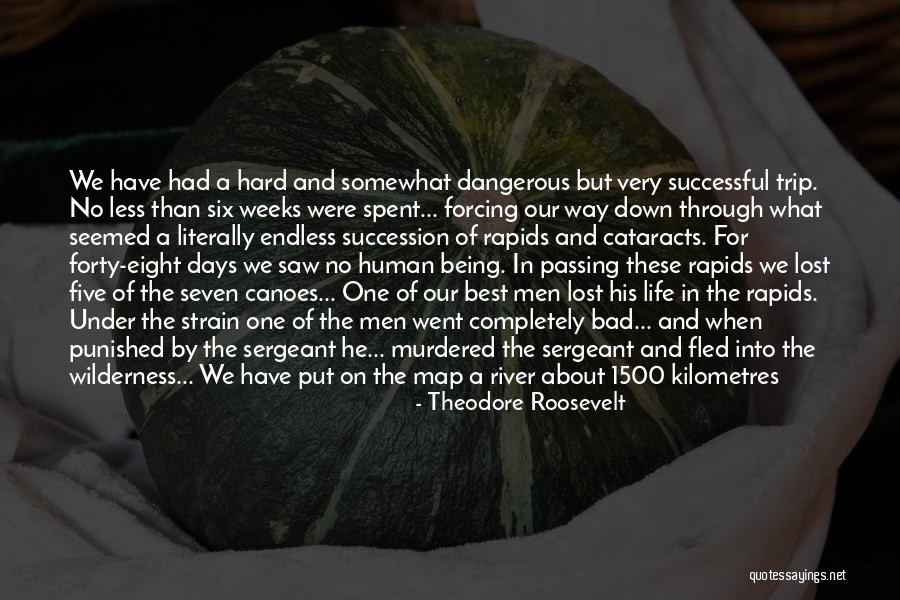
We have had a hard and somewhat dangerous but very successful trip. No less than six weeks were spent... forcing our way down through what seemed a literally endless succession of rapids and cataracts. For forty-eight days we saw no human being. In passing these rapids we lost five of the seven canoes... One of our best men lost his life in the rapids. Under the strain one of the men went completely bad... and when punished by the sergeant he... murdered the sergeant and fled into the wilderness... We have put on the map a river about 1500 kilometres in length... Until now its upper course has been utterly unknown to every one, and its lower course... unknown to all cartographers. — Theodore Roosevelt
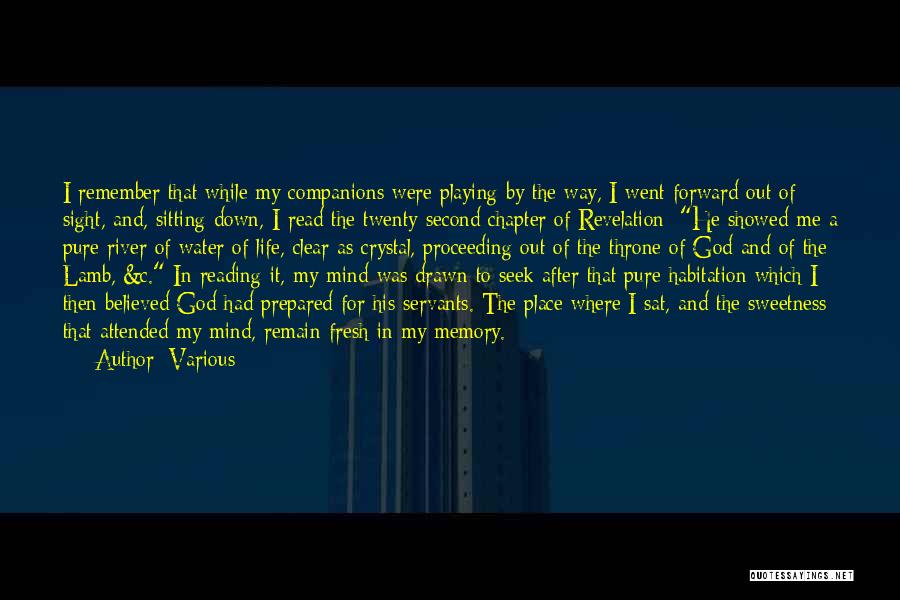
I remember that while my companions were playing by the way, I went forward out of sight, and, sitting down, I read the twenty-second chapter of Revelation: "He showed me a pure river of water of life, clear as crystal, proceeding out of the throne of God and of the Lamb, &c." In reading it, my mind was drawn to seek after that pure habitation which I then believed God had prepared for his servants. The place where I sat, and the sweetness that attended my mind, remain fresh in my memory. — Various
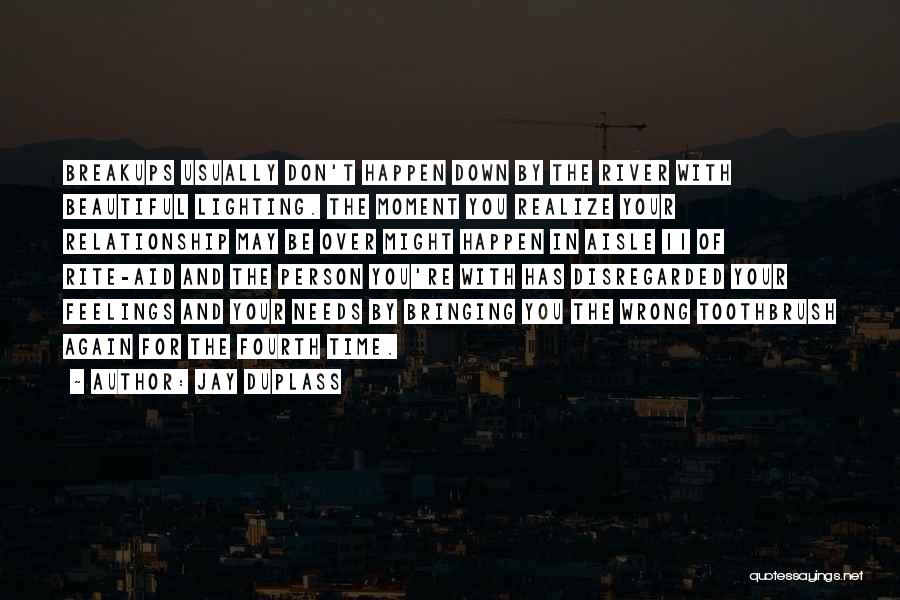
Breakups usually don't happen down by the river with beautiful lighting. The moment you realize your relationship may be over might happen in Aisle 11 of Rite-Aid and the person you're with has disregarded your feelings and your needs by bringing you the wrong toothbrush again for the fourth time. — Jay Duplass
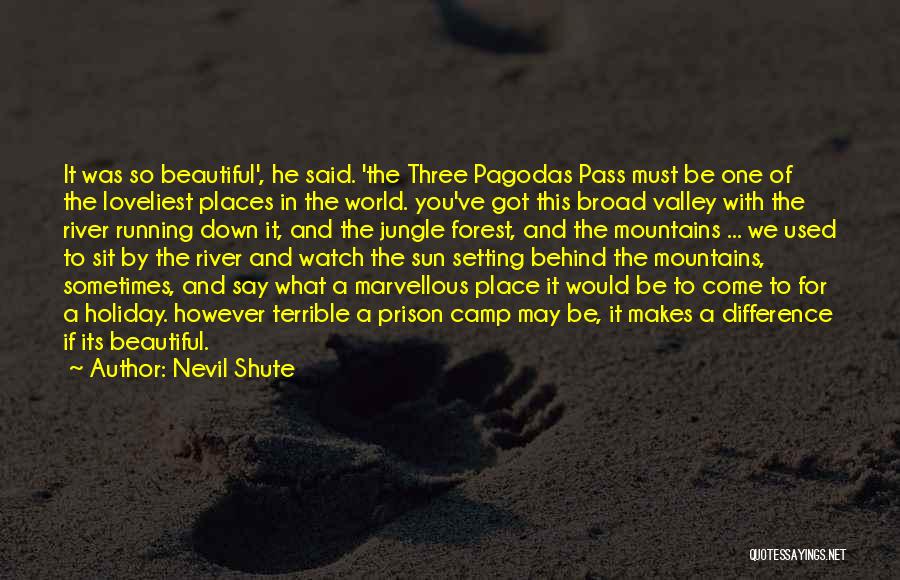
It was so beautiful', he said. 'the Three Pagodas Pass must be one of the loveliest places in the world. you've got this broad valley with the river running down it, and the jungle forest, and the mountains ... we used to sit by the river and watch the sun setting behind the mountains, sometimes, and say what a marvellous place it would be to come to for a holiday. however terrible a prison camp may be, it makes a difference if its beautiful. — Nevil Shute
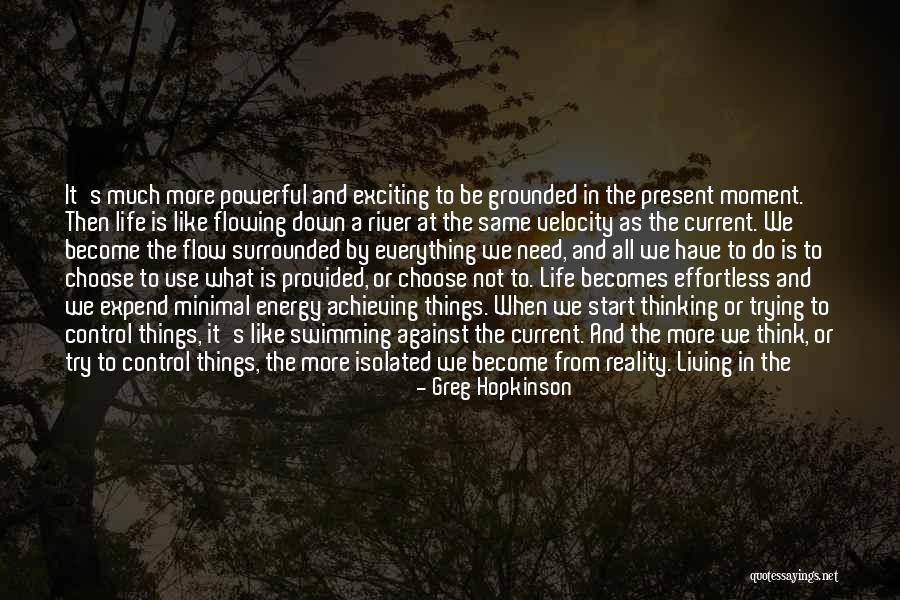
It's much more powerful and exciting to be grounded in the present moment. Then life is like flowing down a river at the same velocity as the current. We become the flow surrounded by everything we need, and all we have to do is to choose to use what is provided, or choose not to. Life becomes effortless and we expend minimal energy achieving things. When we start thinking or trying to control things, it's like swimming against the current. And the more we think, or try to control things, the more isolated we become from reality. Living in the thinking mode requires so much more energy than resting in this present moment. — Greg Hopkinson
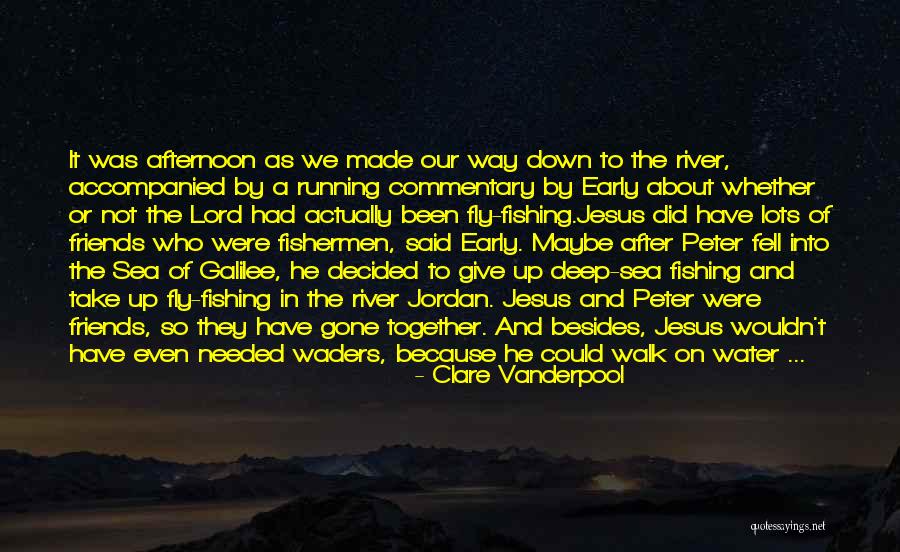
It was afternoon as we made our way down to the river, accompanied by a running commentary by Early about whether or not the Lord had actually been fly-fishing.
Jesus did have lots of friends who were fishermen, said Early. Maybe after Peter fell into the Sea of Galilee, he decided to give up deep-sea fishing and take up fly-fishing in the river Jordan. Jesus and Peter were friends, so they have gone together. And besides, Jesus wouldn't have even needed waders, because he could walk on water ... — Clare Vanderpool
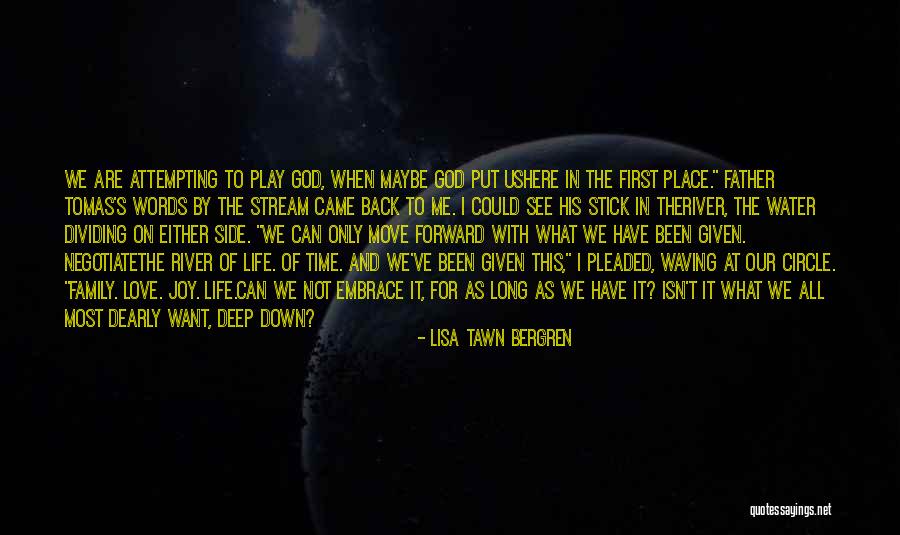
We are attempting to play God, when maybe God put us
here in the first place." Father Tomas's words by the stream came back to me. I could see his stick in the
river, the water dividing on either side. "We can only move forward with what we have been given. Negotiate
the river of life. Of time. And we've been given this," I pleaded, waving at our circle. "Family. Love. Joy. Life.
Can we not embrace it, for as long as we have it? Isn't it what we all most dearly want, deep down? — Lisa Tawn Bergren
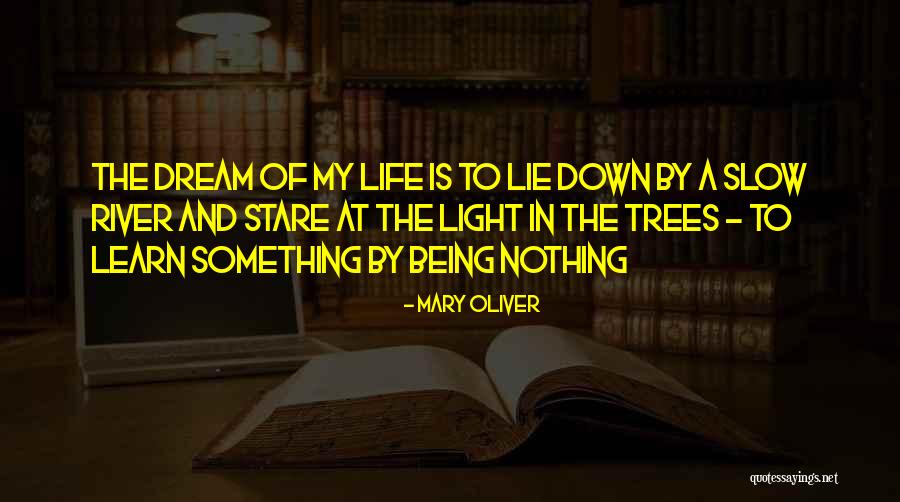
The dream of my life is to lie down by a slow river and stare at the light in the trees - to learn something by being nothing — Mary Oliver
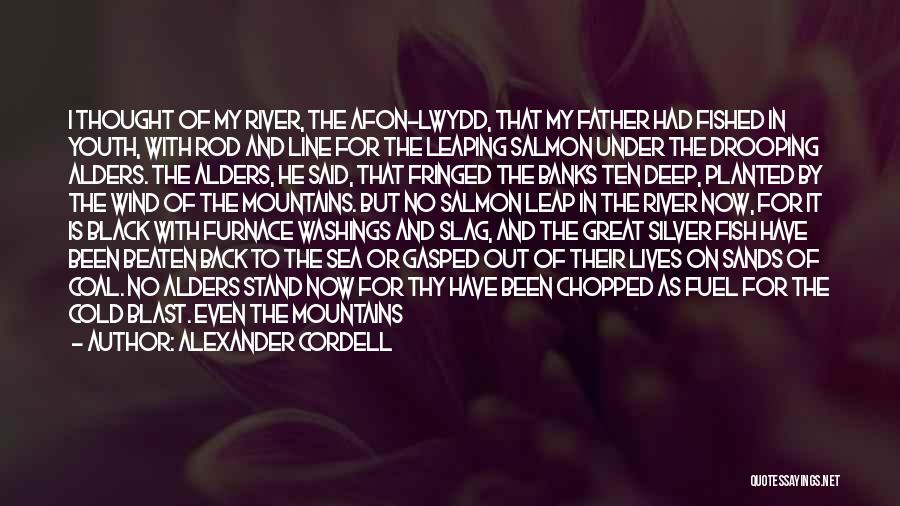
I thought of my river, the Afon-Lwydd, that my father had fished in youth, with rod and line for the leaping salmon under the drooping alders. The alders, he said, that fringed the banks ten deep, planted by the wind of the mountains. But no salmon leap in the river now, for it is black with furnace washings and slag, and the great silver fish have been beaten back to the sea or gasped out of their lives on sands of coal. No alders stand now for thy have been chopped as fuel for the cold blast. Even the mountains are shells, groaning in their hollows of emptiness, trembling to the arrows of the pit-props in their sides, bellowing down the old workings that collapse in unseen dust five hundred feet below. Plundered is my country, violated, raped. — Alexander Cordell
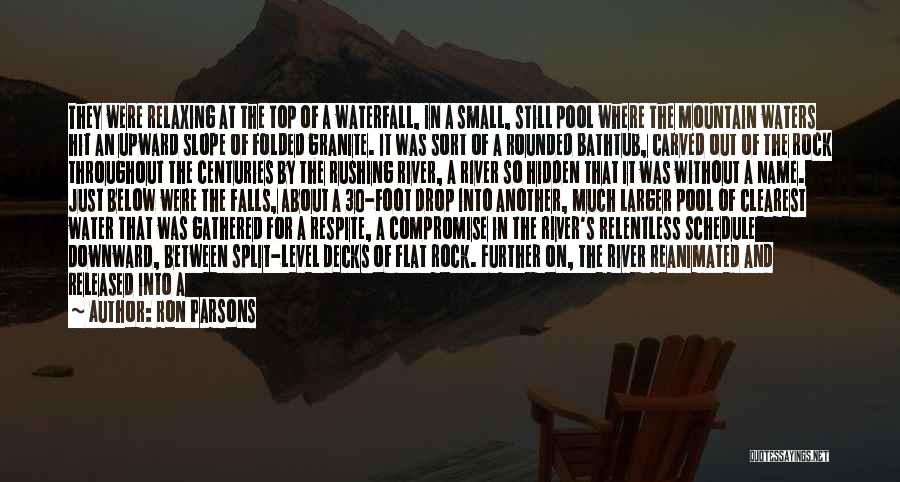
They were relaxing at the top of a waterfall, in a small, still pool where the mountain waters hit an upward slope of folded granite. It was sort of a rounded bathtub, carved out of the rock throughout the centuries by the rushing river, a river so hidden that it was without a name. Just below were the falls, about a 30-foot drop into another, much larger pool of clearest water that was gathered for a respite, a compromise in the river's relentless schedule downward, between split-level decks of flat rock. Further on, the river reanimated and released into a sharp ravine, pulling westward, down through the rugged mountains and faceless forest
the Black Hills National Forest
gaining force until it joined with the rush of the Castle River, near the old Custer Trail, and was swallowed into the Deerfield Reservoir to collect and prepare for the touch of man. — Ron Parsons
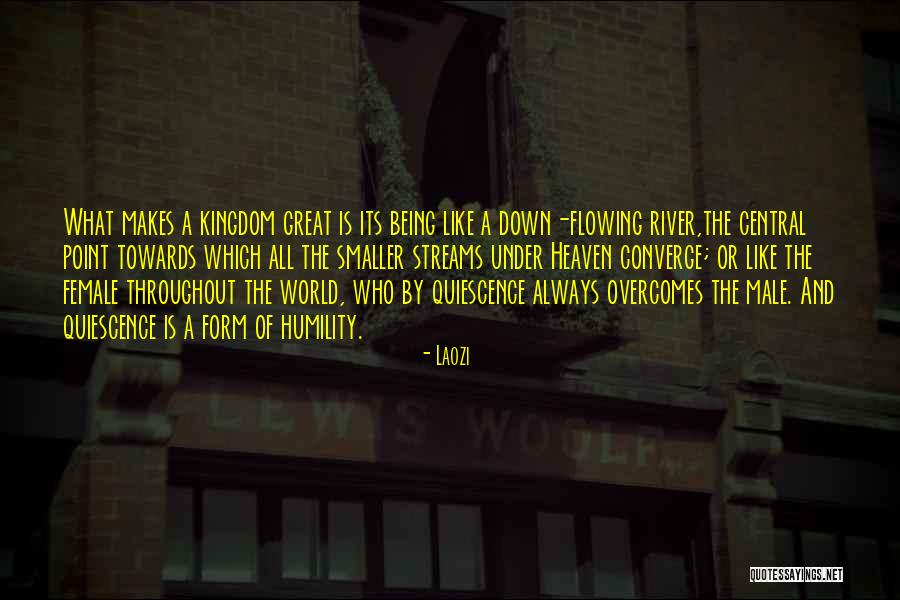
What makes a kingdom great is its being like a down-flowing river,
the central point towards which all the smaller streams under Heaven converge; or like the female throughout the world, who by quiescence always overcomes the male. And quiescence is a form of humility. — Laozi
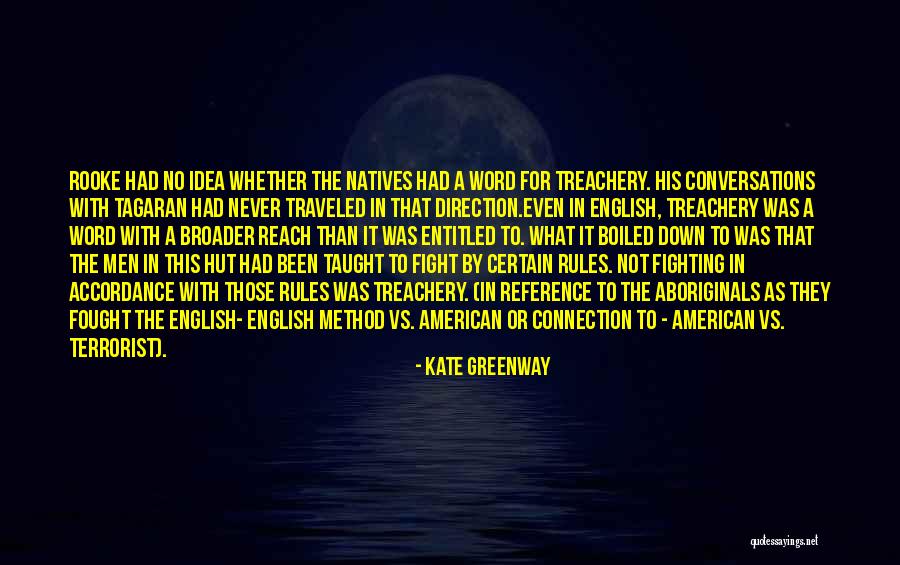
Rooke had no idea whether the natives had a word for treachery. His conversations with Tagaran had never traveled in that direction.
Even in English, treachery was a word with a broader reach than it was entitled to. What it boiled down to was that the men in this hut had been taught to fight by certain rules. Not fighting in accordance with those rules was treachery. (in reference to the aboriginals as they fought the English- English method vs. American or connection to - American vs. terrorist). — Kate Greenway
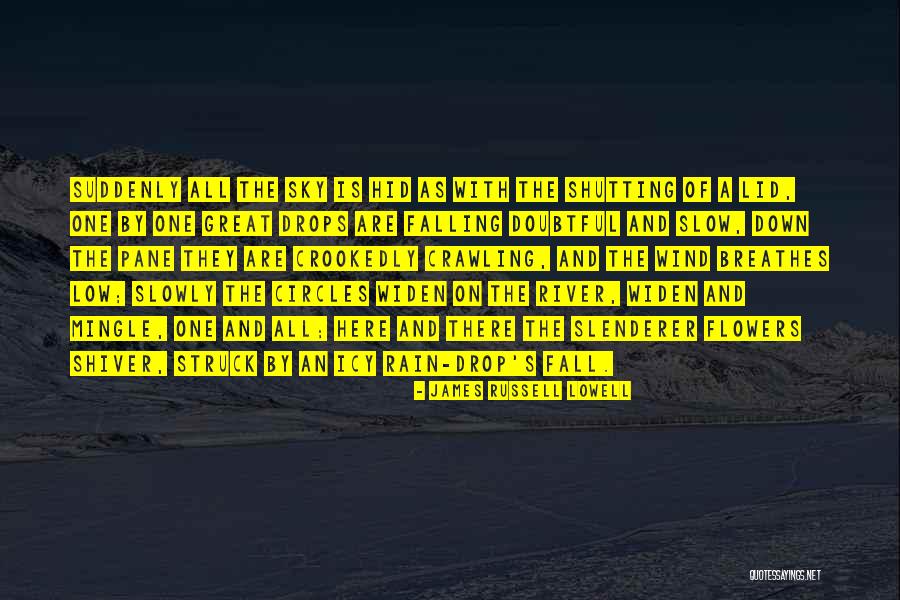
Suddenly all the sky is hid As with the shutting of a lid, One by one great drops are falling Doubtful and slow, Down the pane they are crookedly crawling, And the wind breathes low; Slowly the circles widen on the river, Widen and mingle, one and all; Here and there the slenderer flowers shiver, Struck by an icy rain-drop's fall. — James Russell Lowell
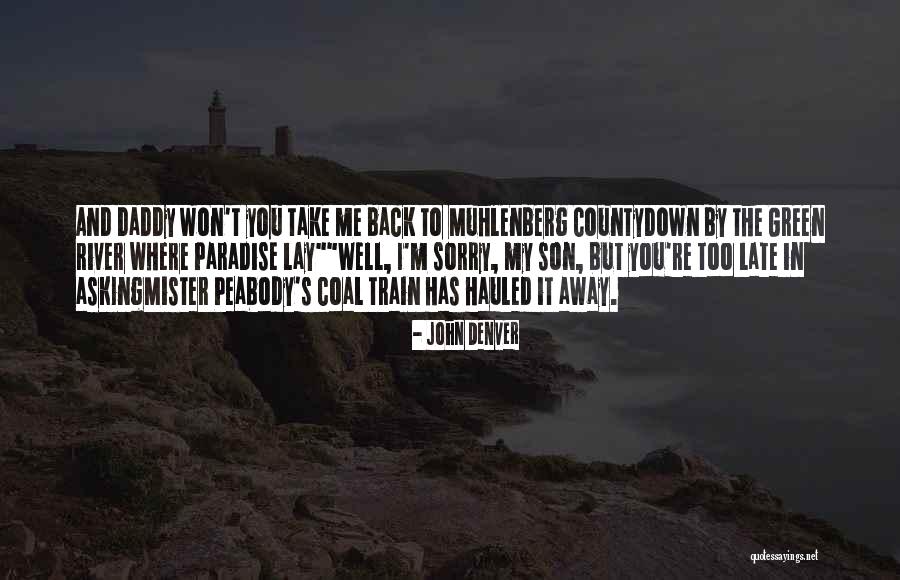
And daddy won't you take me back to Muhlenberg County
Down by the Green River where Paradise lay"
"Well, I'm sorry, my son, but you're too late in asking
Mister Peabody's coal train has hauled it away. — John Denver
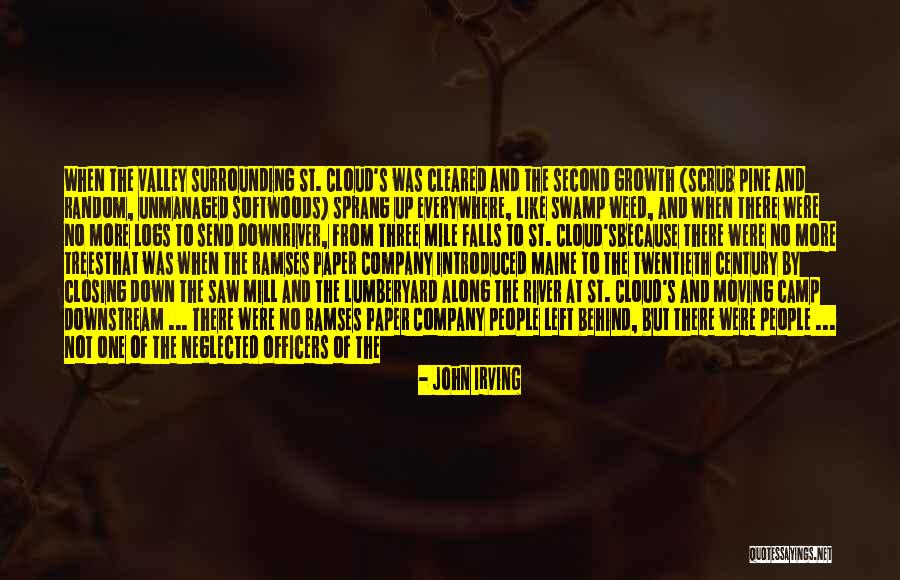
When the valley surrounding St. Cloud's was cleared and the second growth (scrub pine and random, unmanaged softwoods) sprang up everywhere, like swamp weed, and when there were no more logs to send downriver, from Three Mile Falls to St. Cloud's
because there were no more trees
that was when the Ramses Paper Company introduced Maine to the twentieth century by closing down the saw mill and the lumberyard along the river at St. Cloud's and moving camp downstream ... There were no Ramses Paper Company people left behind, but there were people ...
Not one of the neglected officers of the Catholic Church of St. Cloud's stayed; there were more souls to save by following the Ramses Paper Company downstream. — John Irving
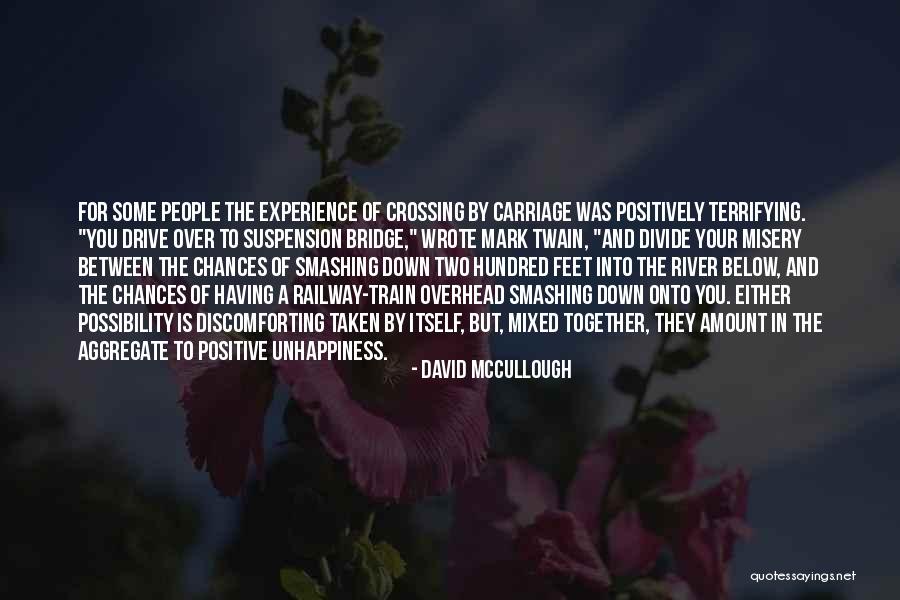
For some people the experience of crossing by carriage was positively terrifying. "You drive over to Suspension Bridge," wrote Mark Twain, "and divide your misery between the chances of smashing down two hundred feet into the river below, and the chances of having a railway-train overhead smashing down onto you. Either possibility is discomforting taken by itself, but, mixed together, they amount in the aggregate to positive unhappiness. — David McCullough
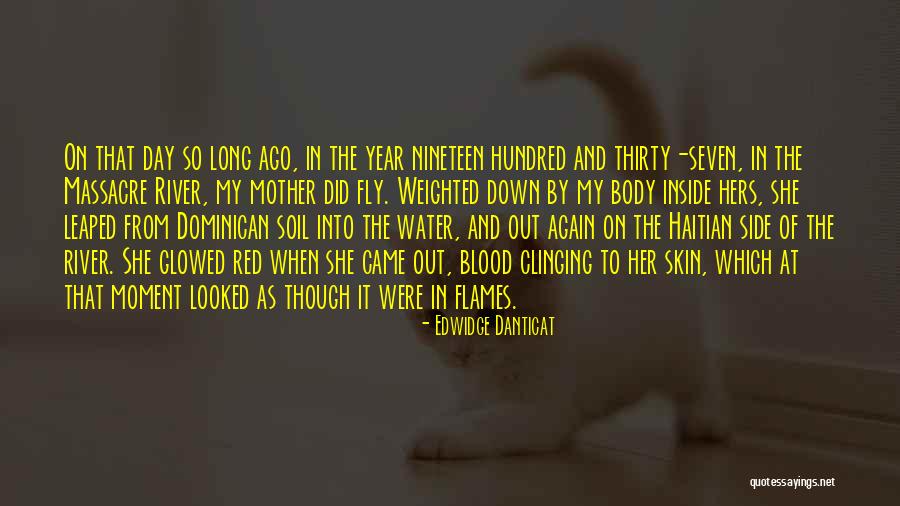
On that day so long ago, in the year nineteen hundred and thirty-seven, in the Massacre River, my mother did fly. Weighted down by my body inside hers, she leaped from Dominican soil into the water, and out again on the Haitian side of the river. She glowed red when she came out, blood clinging to her skin, which at that moment looked as though it were in flames. — Edwidge Danticat
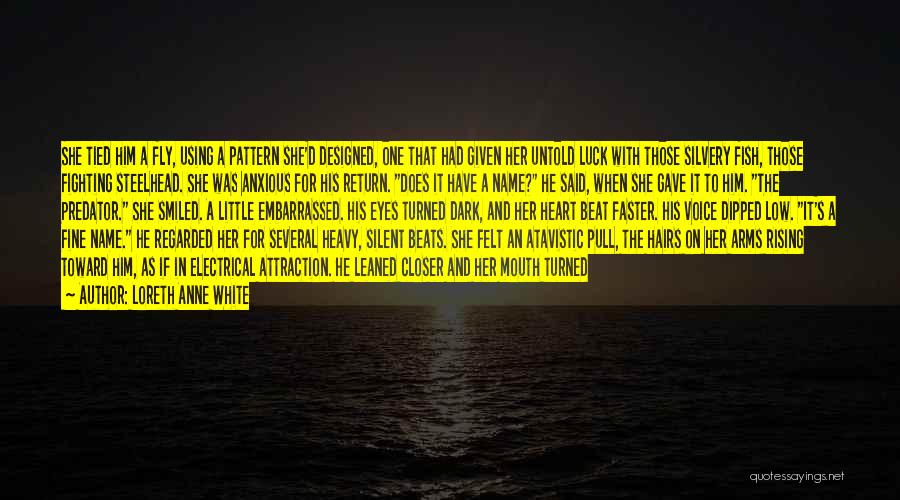
She tied him a fly, using a pattern she'd designed, one that had given her untold luck with those silvery fish, those fighting steelhead. She was anxious for his return.
"Does it have a name?" he said, when she gave it to him.
"The Predator." She smiled. A little embarrassed.
His eyes turned dark, and her heart beat faster. His voice dipped low. "It's a fine name."
He regarded her for several heavy, silent beats. She felt an atavistic pull, the hairs on her arms rising toward him, as if in electrical attraction. He leaned closer and her mouth turned dry. And he told her about the wild blueberries. Down by the bend in the river.
She took the lure.
She went in search of the berries.
She never came home. — Loreth Anne White
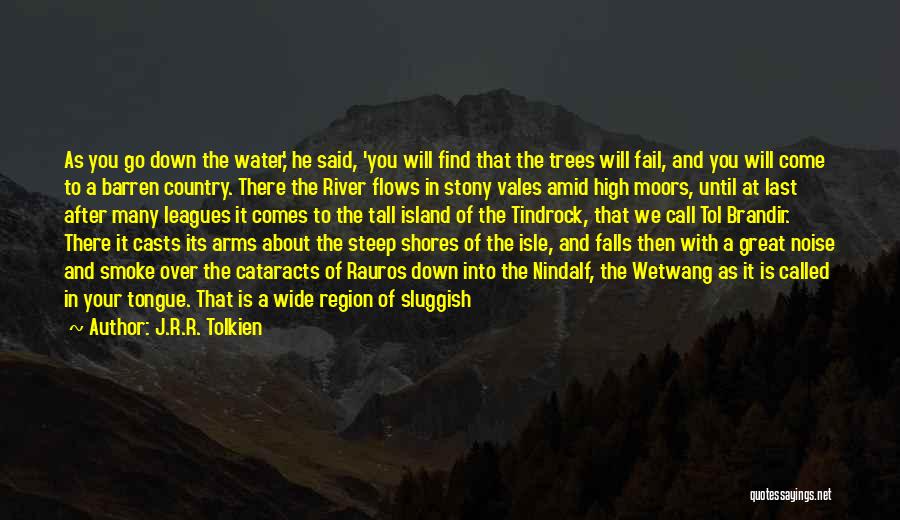
As you go down the water,' he said, 'you will find that the trees will fail, and you will come to a barren country. There the River flows in stony vales amid high moors, until at last after many leagues it comes to the tall island of the Tindrock, that we call Tol Brandir. There it casts its arms about the steep shores of the isle, and falls then with a great noise and smoke over the cataracts of Rauros down into the Nindalf, the Wetwang as it is called in your tongue. That is a wide region of sluggish fen where the stream becomes tortuous and much divided. There the Entwash flows in by many mouths from the Forest of Fangorn in the west. About that stream, on this side of the Great River, lies Rohan. On the further side are the bleak hills of the Emyn Muil. The wind blows from the East there, for they look out over the Dead Marshes and the Noman-lands to Cirith Gorgor and the black gates of Mordor. — J.R.R. Tolkien
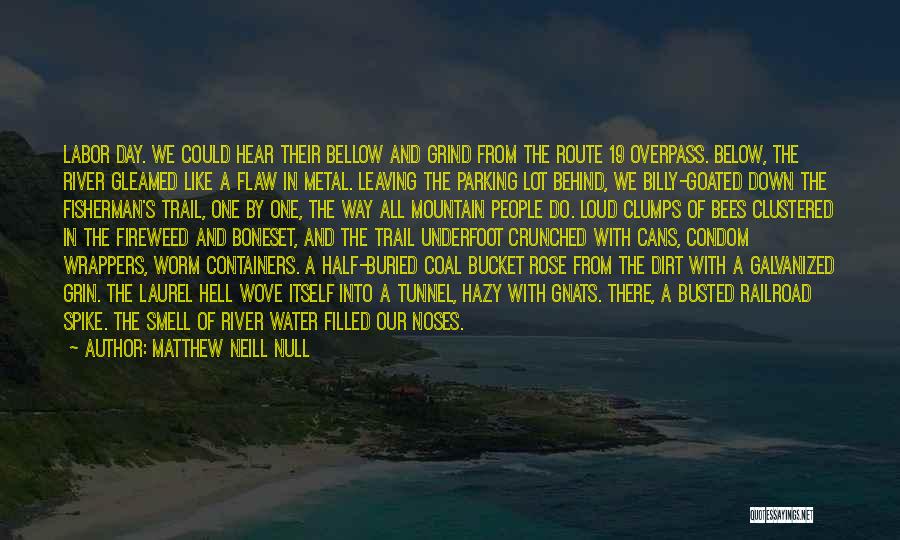
Labor Day. We could hear their bellow and grind from the Route 19 overpass. Below, the river gleamed like a flaw in metal. Leaving the parking lot behind, we billy-goated down the fisherman's trail, one by one, the way all mountain people do. Loud clumps of bees clustered in the fireweed and boneset, and the trail underfoot crunched with cans, condom wrappers, worm containers. A half-buried coal bucket rose from the dirt with a galvanized grin. The laurel hell wove itself into a tunnel, hazy with gnats. There, a busted railroad spike. The smell of river water filled our noses. — Matthew Neill Null
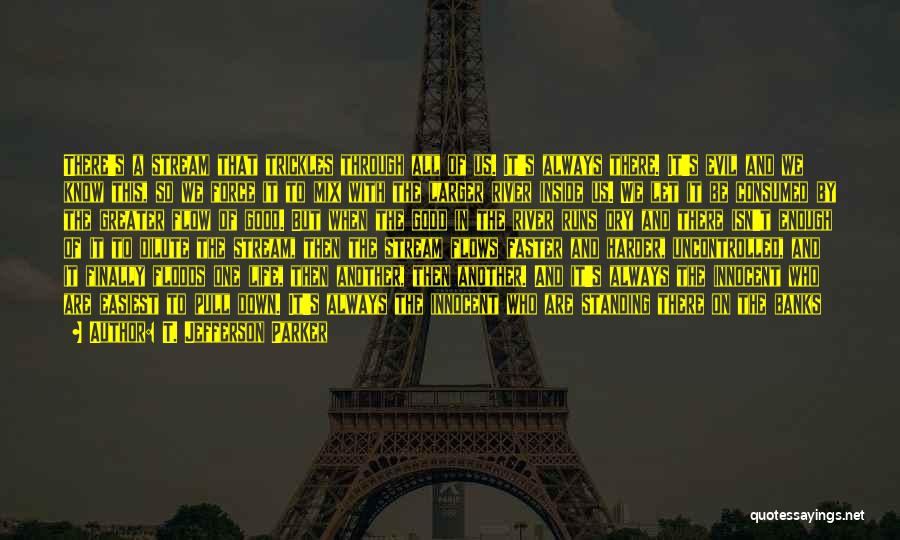
There's a stream that trickles through all of us. It's always there. It's evil and we know this, so we force it to mix with the larger river inside us. We let it be consumed by the greater flow of good. But when the good in the river runs dry and there isn't enough of it to dilute the stream, then the stream flows faster and harder, uncontrolled, and it finally floods one life, then another, then another. And it's always the innocent who are easiest to pull down. It's always the innocent who are standing there on the banks and looking in, curious and trusting and sometimes, maybe, even a little brave. — T. Jefferson Parker
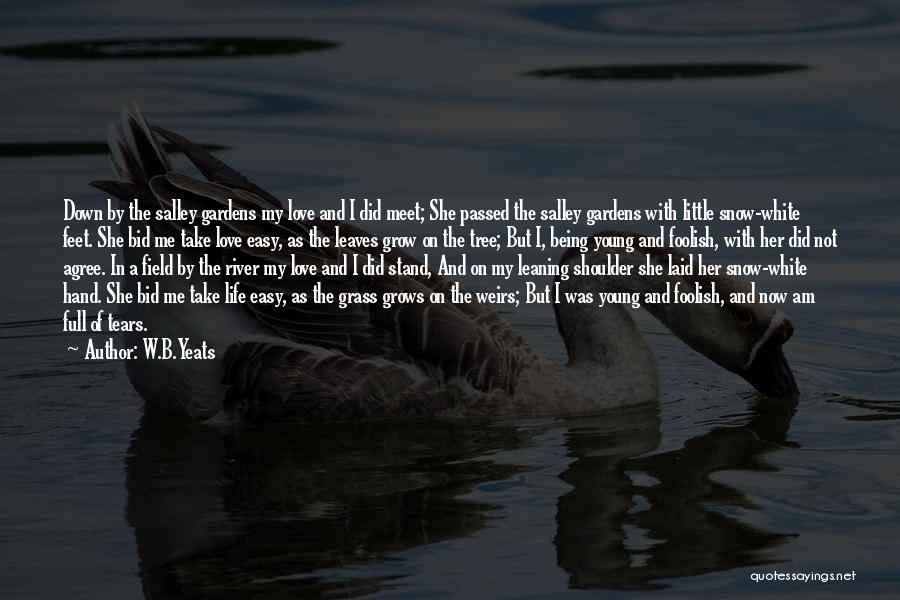
Down by the salley gardens my love and I did meet;
She passed the salley gardens with little snow-white feet.
She bid me take love easy, as the leaves grow on the tree;
But I, being young and foolish, with her did not agree.
In a field by the river my love and I did stand,
And on my leaning shoulder she laid her snow-white hand.
She bid me take life easy, as the grass grows on the weirs;
But I was young and foolish, and now am full of tears. — W.B.Yeats
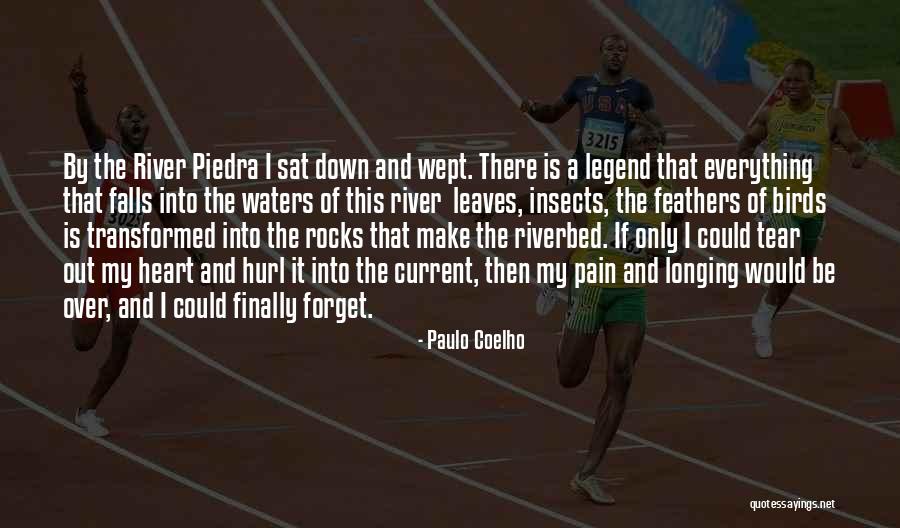
By the River Piedra I sat down and wept. There is a legend that everything that falls into the waters of this river
leaves, insects, the feathers of birds
is transformed into the rocks that make the riverbed. If only I could tear out my heart and hurl it into the current, then my pain and longing would be over, and I could finally forget. — Paulo Coelho
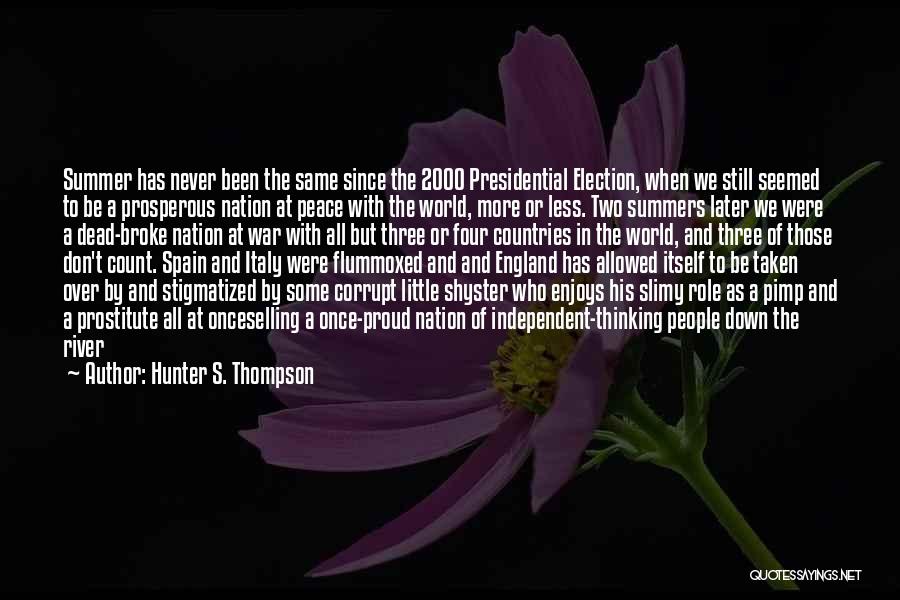
Summer has never been the same since the 2000 Presidential Election, when we still seemed to be a prosperous nation at peace with the world, more or less. Two summers later we were a dead-broke nation at war with all but three or four countries in the world, and three of those don't count. Spain and Italy were flummoxed and and England has allowed itself to be taken over by and stigmatized by some corrupt little shyster who enjoys his slimy role as a pimp and a prostitute all at once
selling a once-proud nation of independent-thinking people down the river and into a deadly swamp of slavery to the pimps who love Jesus and George Bush and the war-crazed U.S. Pentagon. — Hunter S. Thompson
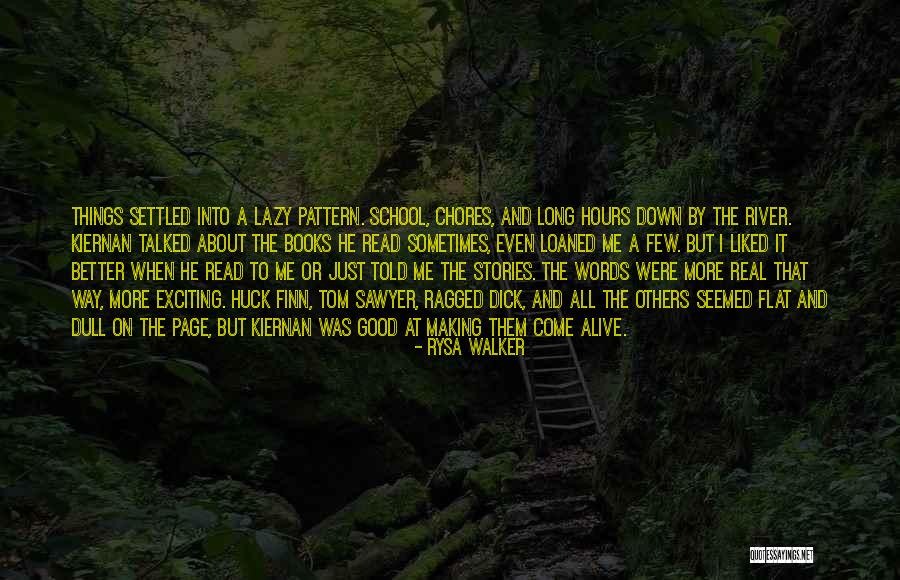
Things settled into a lazy pattern. School, chores, and long hours down by the river. Kiernan talked about the books he read sometimes, even loaned me a few. But I liked it better when he read to me or just told me the stories. The words were more real that way, more exciting. Huck Finn, Tom Sawyer, Ragged Dick, and all the others seemed flat and dull on the page, but Kiernan was good at making them come alive. — Rysa Walker
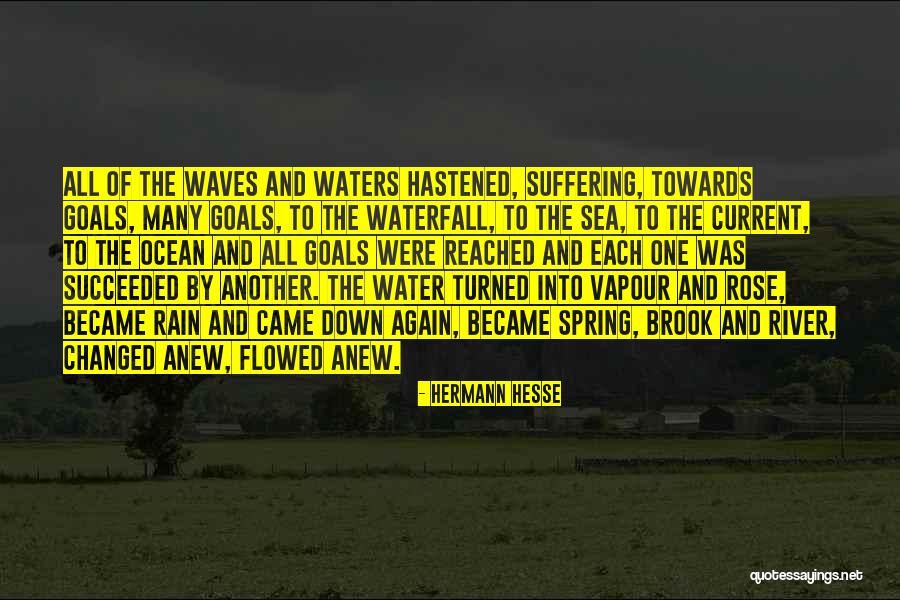
All of the waves and waters hastened, suffering, towards goals, many goals, to the waterfall, to the sea, to the current, to the ocean and all goals were reached and each one was succeeded by another. The water turned into vapour and rose, became rain and came down again, became spring, brook and river, changed anew, flowed anew. — Hermann Hesse
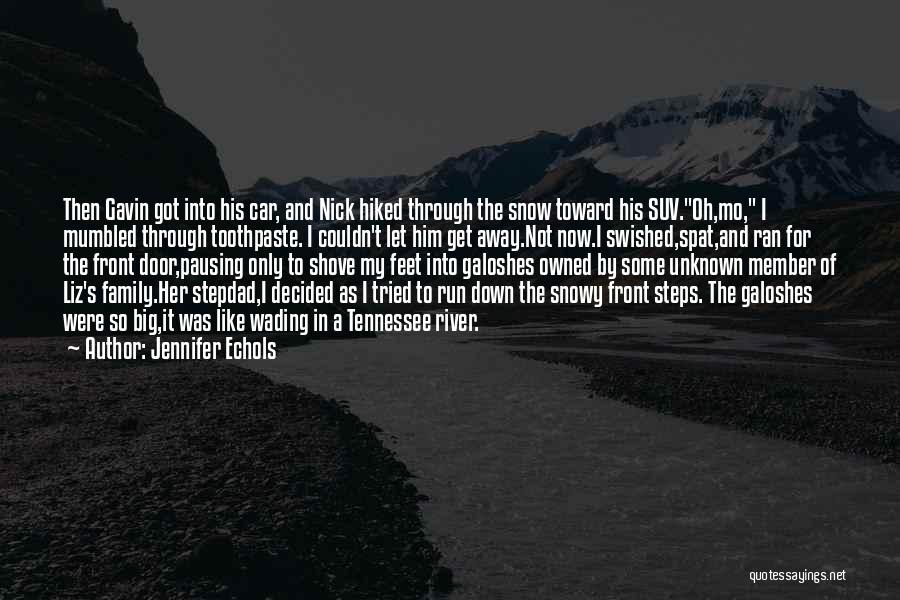
Then Gavin got into his car, and Nick hiked through the snow toward his SUV.
"Oh,mo," I mumbled through toothpaste. I couldn't let him get away.Not now.
I swished,spat,and ran for the front door,pausing only to shove my feet into galoshes owned by some unknown member of Liz's family.Her stepdad,I decided as I tried to run down the snowy front steps. The galoshes were so big,it was like wading in a Tennessee river. — Jennifer Echols
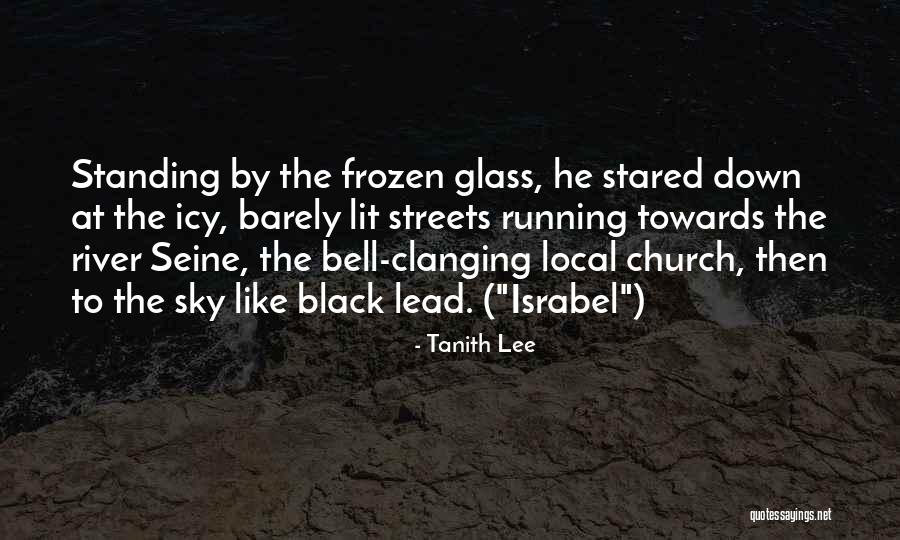
Standing by the frozen glass, he stared down at the icy, barely lit streets running towards the river Seine, the bell-clanging local church, then to the sky like black lead. ("Israbel") — Tanith Lee
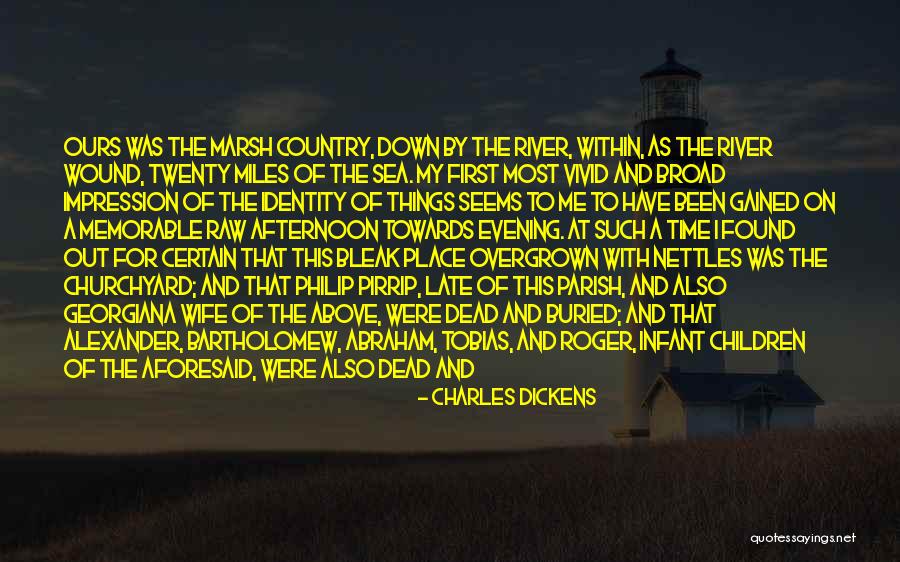
Ours was the marsh country, down by the river, within, as the river wound, twenty miles of the sea. My first most vivid and broad impression of the identity of things seems to me to have been gained on a memorable raw afternoon towards evening. At such a time I found out for certain that this bleak place overgrown with nettles was the churchyard; and that Philip Pirrip, late of this parish, and also Georgiana wife of the above, were dead and buried; and that Alexander, Bartholomew, Abraham, Tobias, and Roger, infant children of the aforesaid, were also dead and buried; and that the dark flat wilderness beyond the churchyard, intersected with dikes and mounds and gates, with scattered cattle feeding on it, was the marshes; and that the low leaden line beyond was the river; and that the distant savage lair from which the wind was rushing was the sea; and that the small bundle of shivers growing afraid of it all and beginning to cry, was Pip. "Hold — Charles Dickens
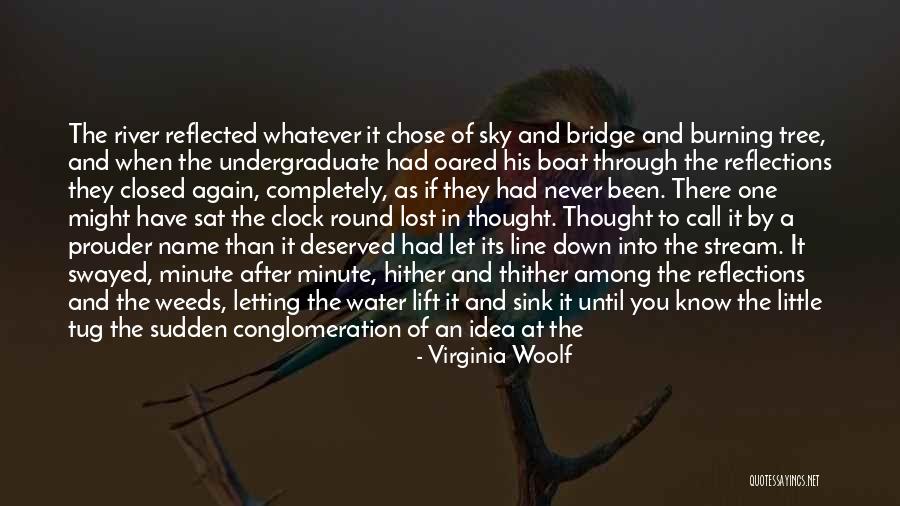
The river reflected whatever it chose of sky and bridge and burning tree, and when the undergraduate had oared his boat through the reflections they closed again, completely, as if they had never been. There one might have sat the clock round lost in thought. Thought
to call it by a prouder name than it deserved
had let its line down into the stream. It swayed, minute after minute, hither and thither among the reflections and the weeds, letting the water lift it and sink it until
you know the little tug
the sudden conglomeration of an idea at the end of one's line: and then the cautious hauling of it in, and the careful laying of it out? Alas, laid on the grass how small, how insignificant this thought of mine looked; the sort of fish that a good fisherman puts back into the water so that it may grow fatter and be one day worth cooking and eating. — Virginia Woolf
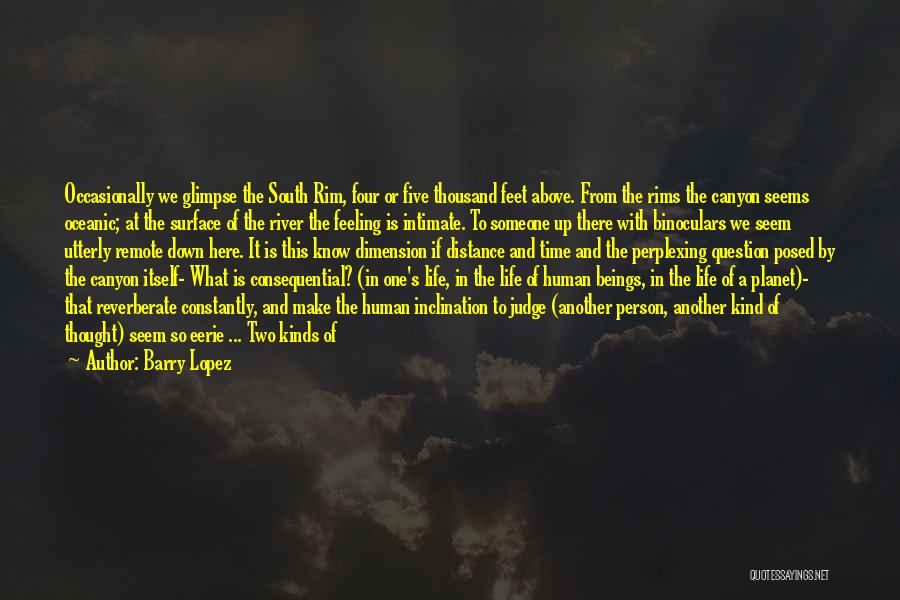
Occasionally we glimpse the South Rim, four or five thousand feet above. From the rims the canyon seems oceanic; at the surface of the river the feeling is intimate. To someone up there with binoculars we seem utterly remote down here. It is this know dimension if distance and time and the perplexing question posed by the canyon itself- What is consequential? (in one's life, in the life of human beings, in the life of a planet)- that reverberate constantly, and make the human inclination to judge (another person, another kind of thought) seem so eerie ... Two kinds of time pass here: sitting at the edge of a sun-warmed pool watching blue dragonflies and black tadpoles. And the rapids: down the glassy-smooth tongue into a yawing trench, climb a ten-foot wall of standing water and fall into boiling, ferocious hydraulics ... — Barry Lopez
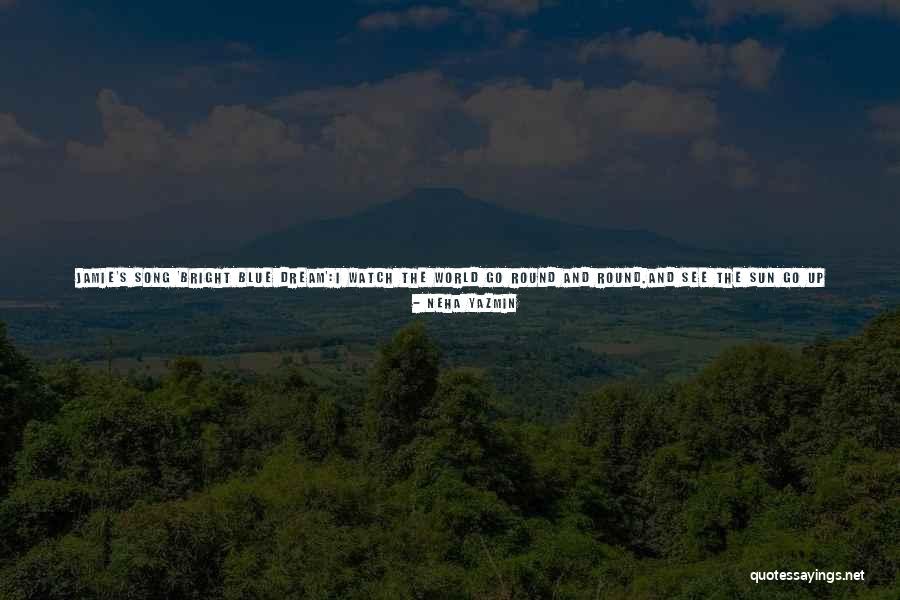
JAMIE'S SONG 'Bright Blue Dream':
I watch the world go round and round.
And see the sun go up and down.
I think I've heard most every sound
Except your voice.
I feel the river by my feet.
And let the tears dry indiscrete.
Seems the horizon's incomplete
Without your face.
The world is a colder place,
Shadows everywhere you used to be.
Darker than the darkest nights I've seen.
And I try go back to that
Bright blue dream.
When there was nothing, there was nothing, but you and me.
Clear blue sky.
Yes there was something, there was something, I could not see. — Neha Yazmin
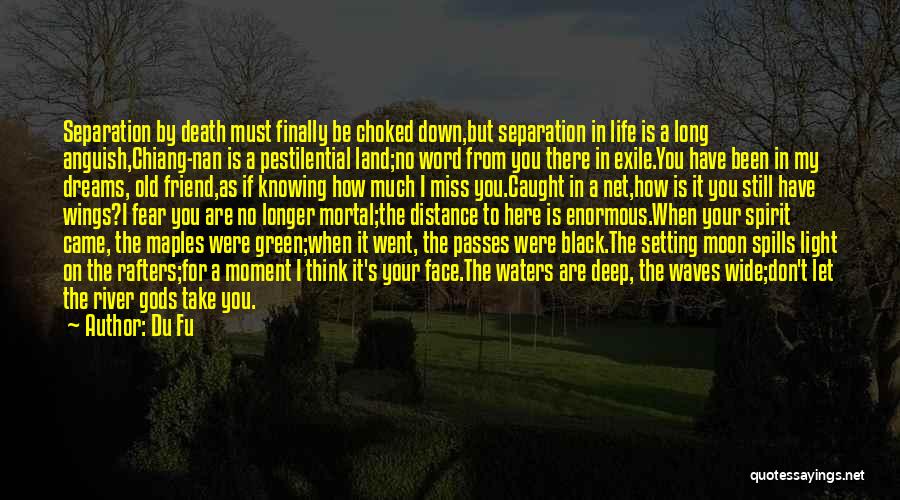
Separation by death must finally be choked down,
but separation in life is a long anguish,
Chiang-nan is a pestilential land;
no word from you there in exile.
You have been in my dreams, old friend,
as if knowing how much I miss you.
Caught in a net,
how is it you still have wings?
I fear you are no longer mortal;
the distance to here is enormous.
When your spirit came, the maples were green;
when it went, the passes were black.
The setting moon spills light on the rafters;
for a moment I think it's your face.
The waters are deep, the waves wide;
don't let the river gods take you. — Du Fu
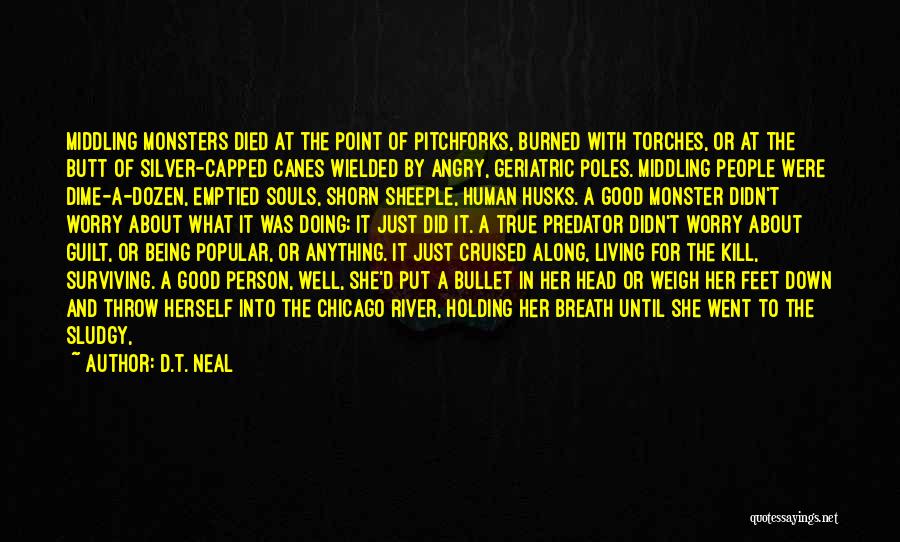
Middling monsters died at the point of pitchforks, burned with torches, or at the butt of silver-capped canes wielded by angry, geriatric Poles. Middling people were dime-a-dozen, emptied souls, shorn sheeple, human husks. A good monster didn't worry about what it was doing; it just did it. A true predator didn't worry about guilt, or being popular, or anything. It just cruised along, living for the kill, surviving. A good person, well, she'd put a bullet in her head or weigh her feet down and throw herself into the Chicago River, holding her breath until she went to the sludgy, filthy bottom, and had to open wide and breathe water until she died. — D.T. Neal
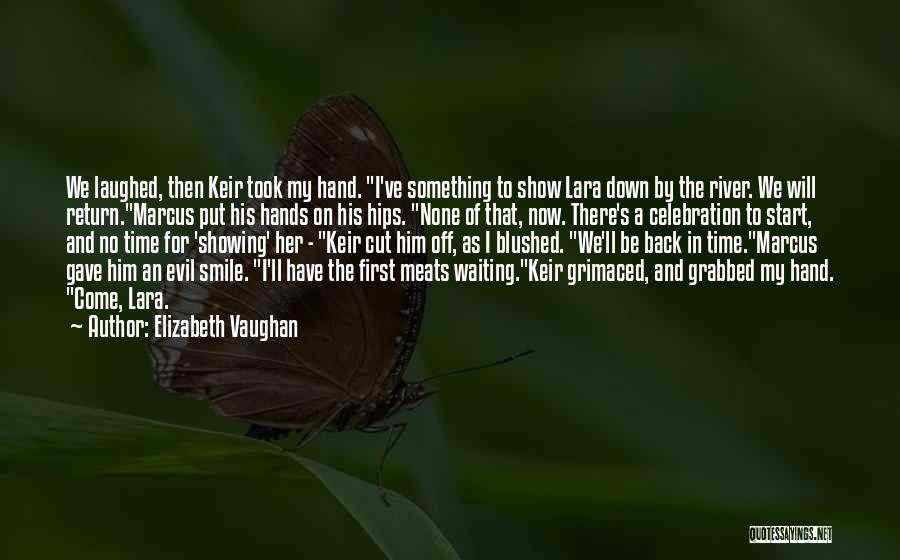
We laughed, then Keir took my hand. "I've something to show Lara down by the river. We will return."
Marcus put his hands on his hips. "None of that, now. There's a celebration to start, and no time for 'showing' her - "
Keir cut him off, as I blushed. "We'll be back in time."
Marcus gave him an evil smile. "I'll have the first meats waiting."
Keir grimaced, and grabbed my hand. "Come, Lara. — Elizabeth Vaughan
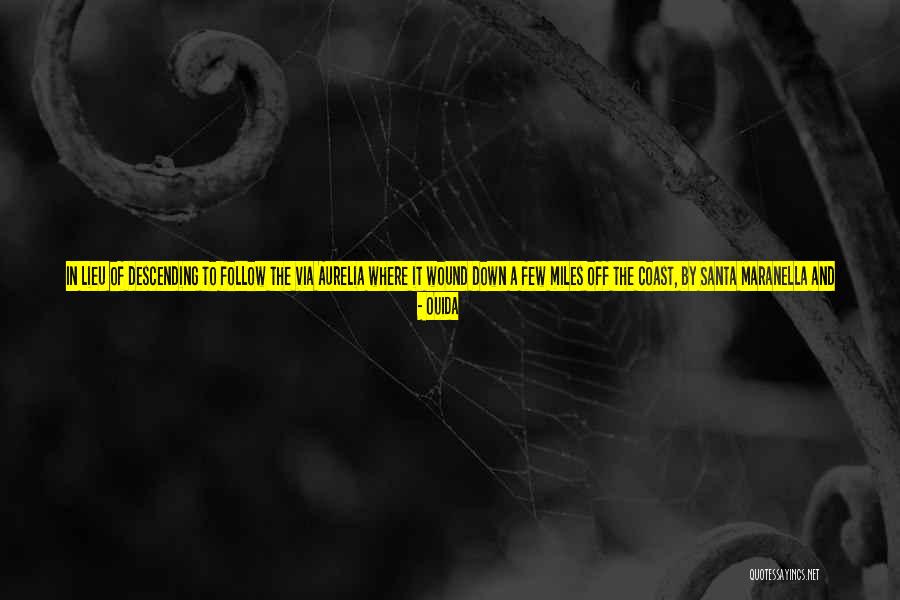
In lieu of descending to follow the Via Aurelia where it wound down a few miles off the coast, by Santa Maranella and Santa Severa and mediaeval Palo, and the volcanic soil and the steep ravines by Cervetri, where the long avenues of cliff-sepulchres are all that remain to show the site of Caere, and gaining so the mouth of Tiber to ascend the stream in any boat that he might find by Fiumicino, he still struck across the country by cattle-tracks known alone to himself and wild men like him, and chose to leave the Maccarese morasses untrodden in his rear, and had followed the course of the Arrone River as far as the high cliffs up by forsaken Galera. — Ouida
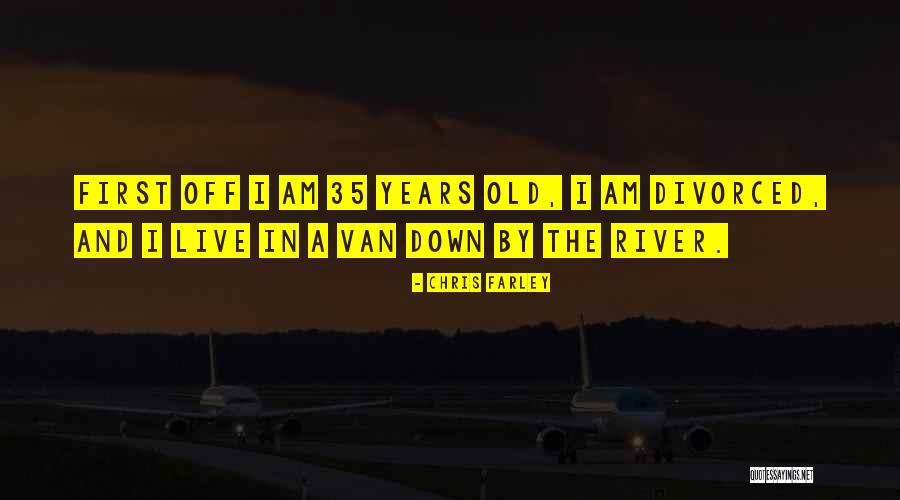
First off I am 35 years old, I am divorced, and I live in a van down by the river. — Chris Farley
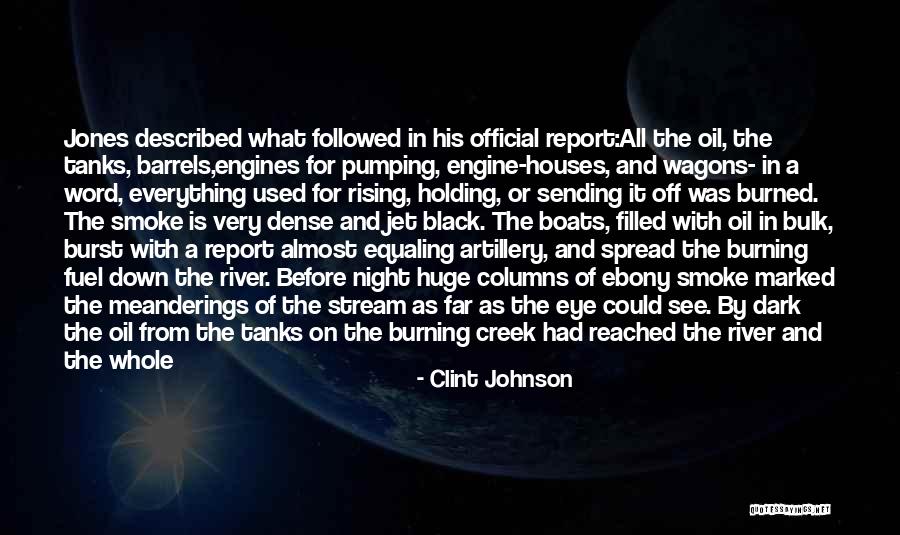
Jones described what followed in his official report:
All the oil, the tanks, barrels,engines for pumping, engine-houses, and wagons- in a word, everything used for rising, holding, or sending it off was burned. The smoke is very dense and jet black. The boats, filled with oil in bulk, burst with a report almost equaling artillery, and spread the burning fuel down the river. Before night huge columns of ebony smoke marked the meanderings of the stream as far as the eye could see. By dark the oil from the tanks on the burning creek had reached the river and the whole stream was a sheet of fire. A burning river, carrying destruction to our merciless enemy, was a scene of magnificence that might well carry joy to every patriotic heart.- General William E. " Grumble" Jones — Clint Johnson
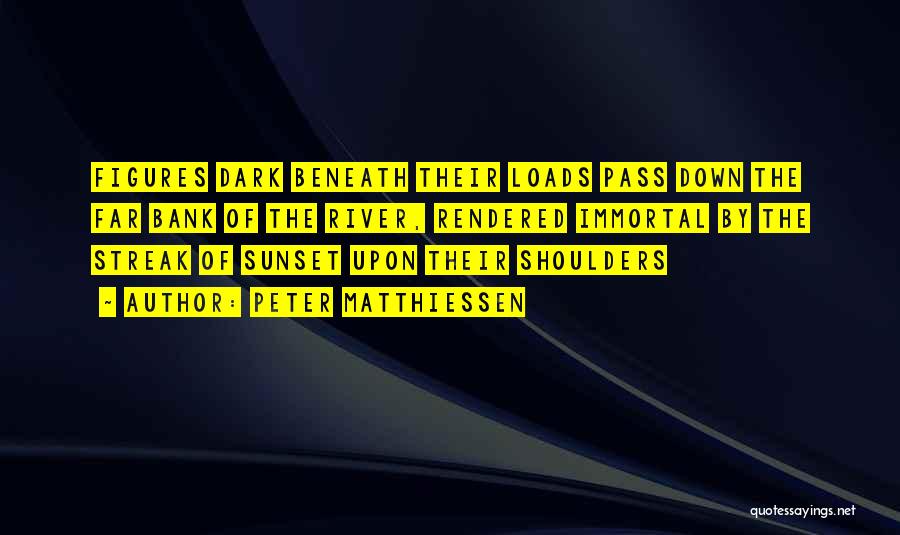
Figures dark beneath their loads pass down the far bank of the river, rendered immortal by the streak of sunset upon their shoulders — Peter Matthiessen
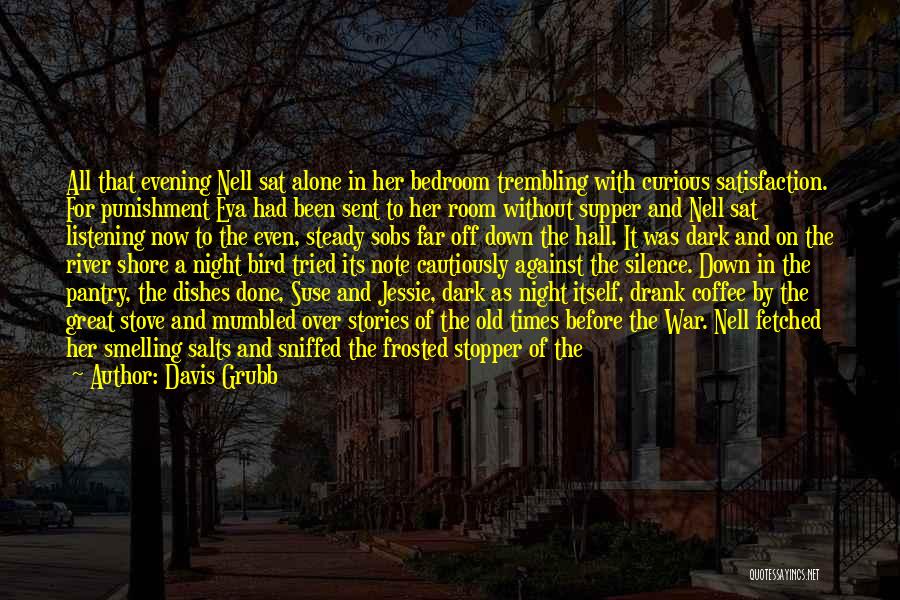
All that evening Nell sat alone in her bedroom trembling with curious satisfaction. For punishment Eva had been sent to her room without supper and Nell sat listening now to the even, steady sobs far off down the hall. It was dark and on the river shore a night bird tried its note cautiously against the silence. Down in the pantry, the dishes done, Suse and Jessie, dark as night itself, drank coffee by the great stove and mumbled over stories of the old times before the War. Nell fetched her smelling salts and sniffed the frosted stopper of the flowered bottle till the trembling stopped. ("Where The Woodbine Twineth") — Davis Grubb
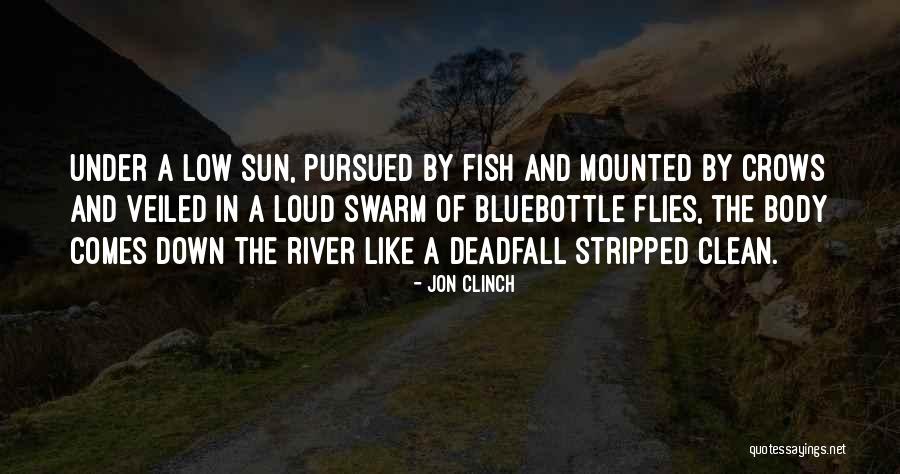
Under a low sun, pursued by fish and mounted by crows and veiled in a loud swarm of bluebottle flies, the body comes down the river like a deadfall stripped clean. — Jon Clinch
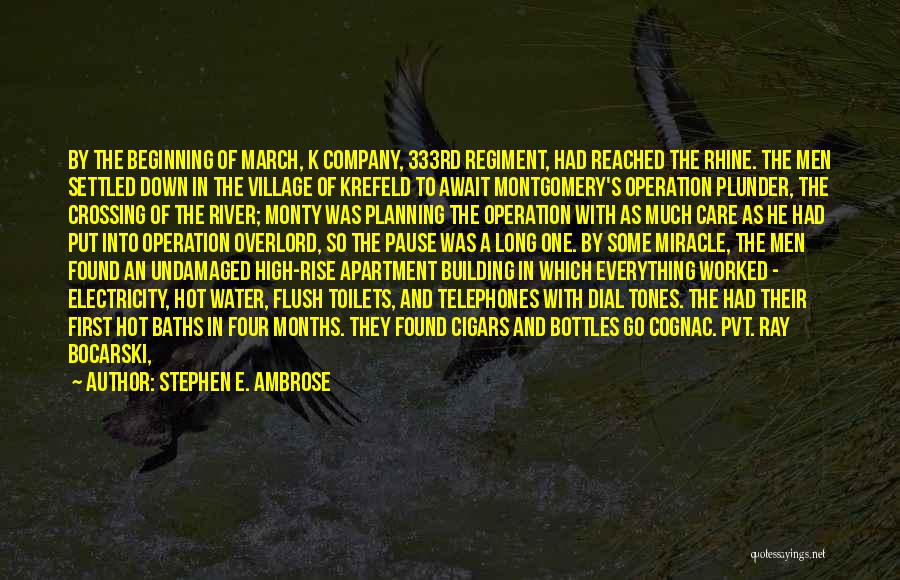
By the beginning of March, K Company, 333rd Regiment, had reached the Rhine. The men settled down in the village of Krefeld to await Montgomery's Operation Plunder, the crossing of the river; Monty was planning the operation with as much care as he had put into Operation Overlord, so the pause was a long one. By some miracle, the men found an undamaged high-rise apartment building in which everything worked - electricity, hot water, flush toilets, and telephones with dial tones. The had their first hot baths in four months. They found cigars and bottles go cognac. Pvt. Ray Bocarski, fluent in German, lit up, sat down in an easy chair, got a befuddled German operator on the phone, and talked his way through to a military headquarters in Berlin. He told the German officer he could expect K Company within the week. — Stephen E. Ambrose
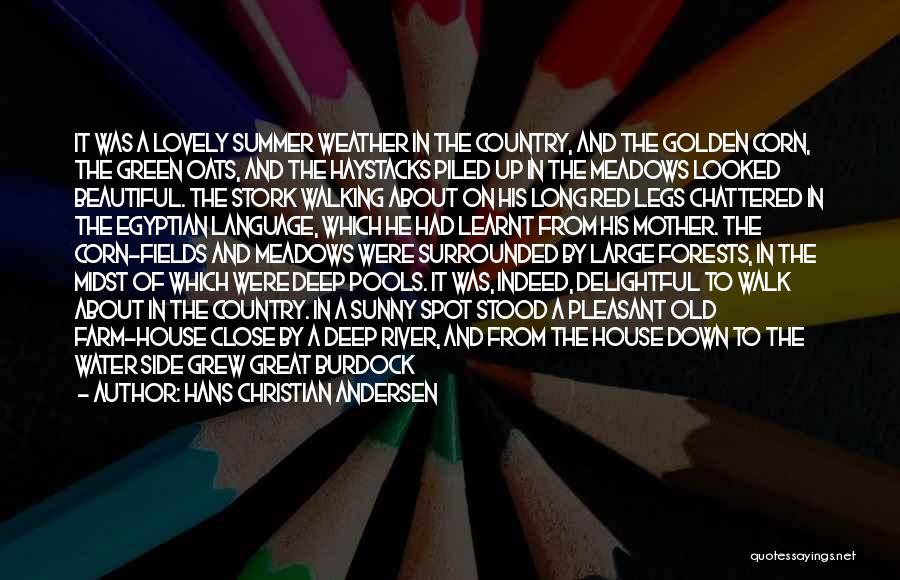
It was a lovely summer weather in the country, and the golden corn, the green oats, and the haystacks piled up in the meadows looked beautiful. The stork walking about on his long red legs chattered in the Egyptian language, which he had learnt from his mother. The corn-fields and meadows were surrounded by large forests, in the midst of which were deep pools. It was, indeed, delightful to walk about in the country. In a sunny spot stood a pleasant old farm-house close by a deep river, and from the house down to the water side grew great burdock leaves, so high, that under the tallest of them a little child could stand upright. The spot was as wild as the centre of a thick wood. In — Hans Christian Andersen
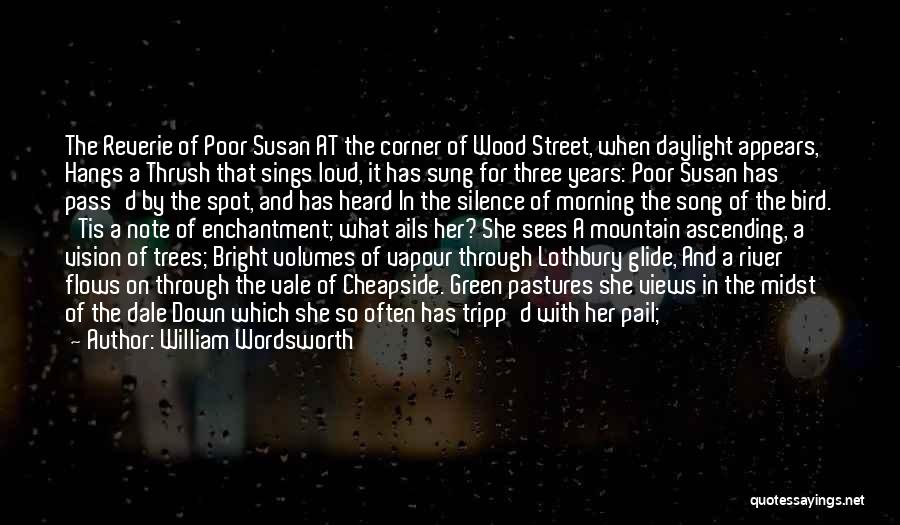
The Reverie of Poor Susan
AT the corner of Wood Street, when daylight appears,
Hangs a Thrush that sings loud, it has sung for three years:
Poor Susan has pass'd by the spot, and has heard
In the silence of morning the song of the bird.
'Tis a note of enchantment; what ails her? She sees
A mountain ascending, a vision of trees;
Bright volumes of vapour through Lothbury glide,
And a river flows on through the vale of Cheapside.
Green pastures she views in the midst of the dale
Down which she so often has tripp'd with her pail;
And a single small cottage, a nest like a dove's,
The one only dwelling on earth that she loves.
She looks, and her heart is in heaven: but they fade,
The mist and the river, the hill and the shade;
The stream will not flow, and the hill will not rise,
And the colours have all pass'd away from her eyes! — William Wordsworth
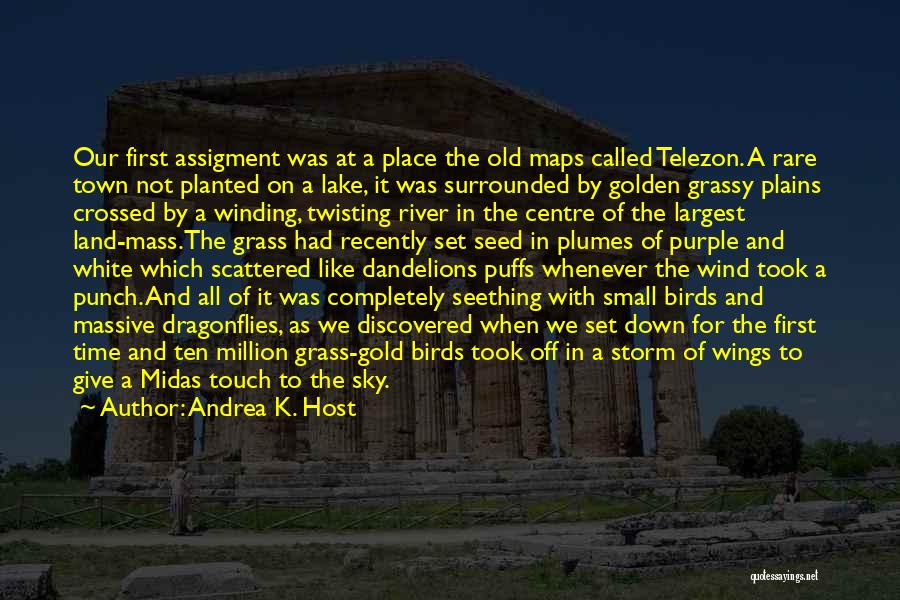
Our first assigment was at a place the old maps called Telezon. A rare town not planted on a lake, it was surrounded by golden grassy plains crossed by a winding, twisting river in the centre of the largest land-mass.
The grass had recently set seed in plumes of purple and white which scattered like dandelions puffs whenever the wind took a punch. And all of it was completely seething with small birds and massive dragonflies, as we discovered when we set down for the first time and ten million grass-gold birds took off in a storm of wings to give a Midas touch to the sky. — Andrea K. Host
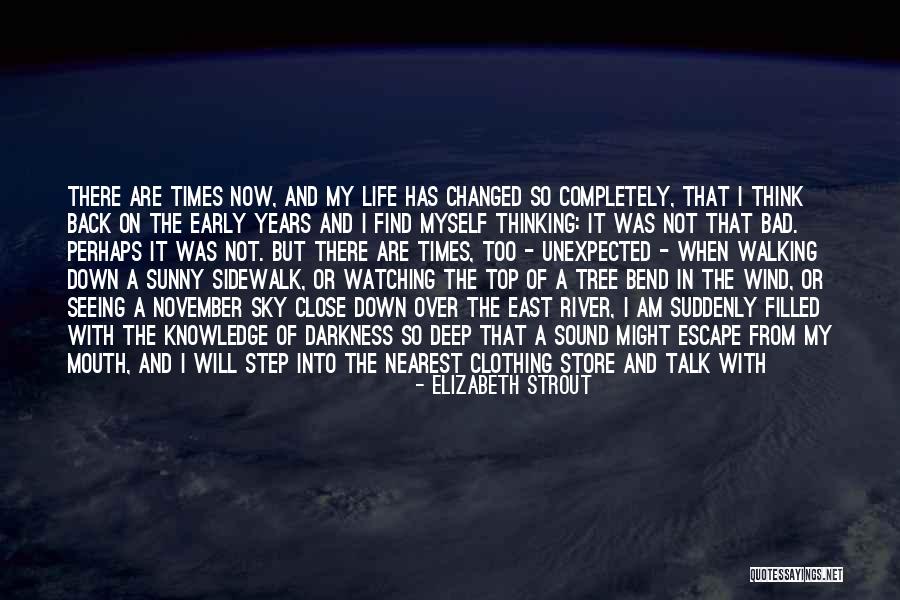
There are times now, and my life has changed so completely, that I think back on the early years and I find myself thinking: It was not that bad. Perhaps it was not. But there are times, too - unexpected - when walking down a sunny sidewalk, or watching the top of a tree bend in the wind, or seeing a November sky close down over the East River, I am suddenly filled with the knowledge of darkness so deep that a sound might escape from my mouth, and I will step into the nearest clothing store and talk with a stranger about the shape of sweaters newly arrived. This must be the way most of us maneuver through the world, half knowing, half not, visited by memories that can't possibly be true. But when I see others walking with confidence down the sidewalk, as though they are free completely from terror, I realize I don't know how others are. So much of life seems speculation. — Elizabeth Strout
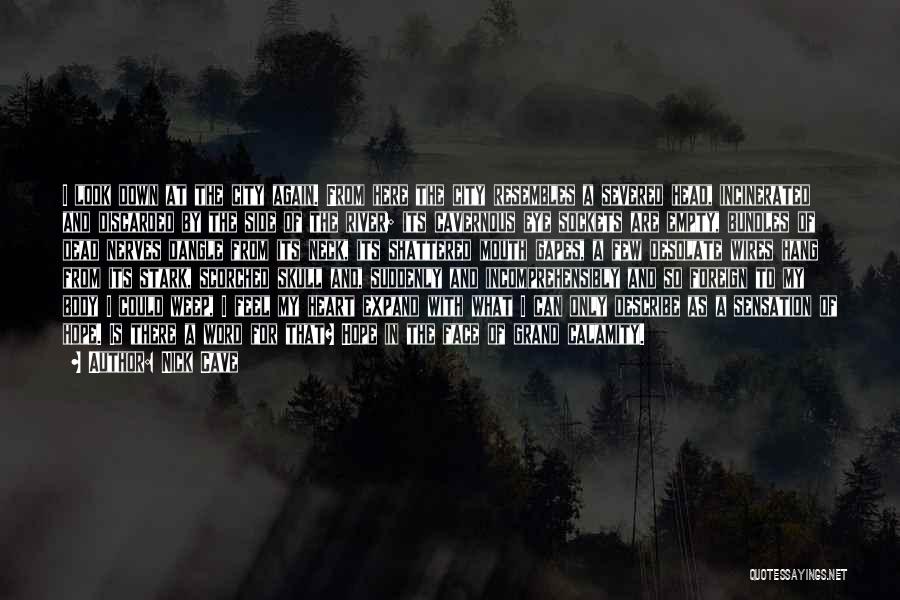
I look down at the city again. From here the city resembles a severed head, incinerated and discarded by the side of the river; its cavernous eye sockets are empty, bundles of dead nerves dangle from its neck, its shattered mouth gapes, a few desolate wires hang from its stark, scorched skull and, suddenly and incomprehensibly and so foreign to my body I could weep, I feel my heart expand with what I can only describe as a sensation of hope. Is there a word for that? Hope in the face of grand calamity. — Nick Cave
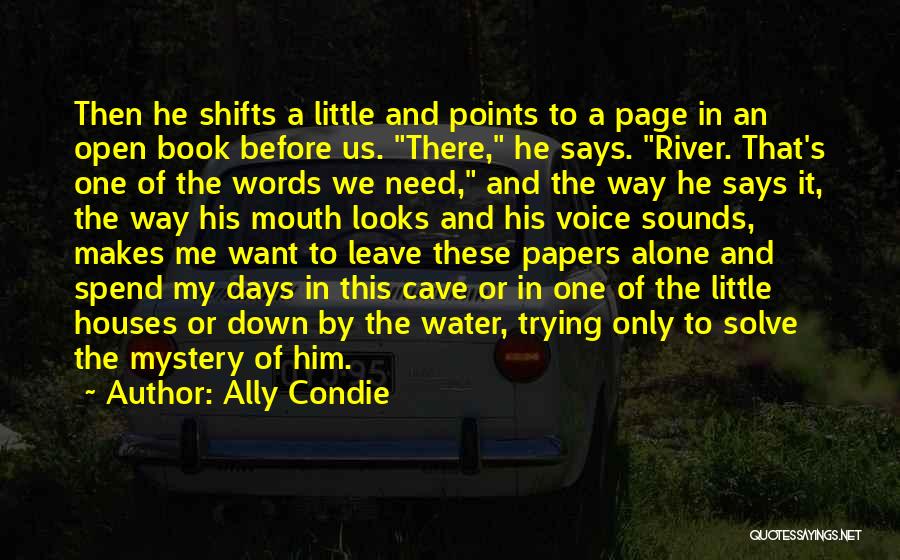
Then he shifts a little and points to a page in an open book before us. "There," he says. "River. That's one of the words we need," and the way he says it, the way his mouth looks and his voice sounds, makes me want to leave these papers alone and spend my days in this cave or in one of the little houses or down by the water, trying only to solve the mystery of him. — Ally Condie
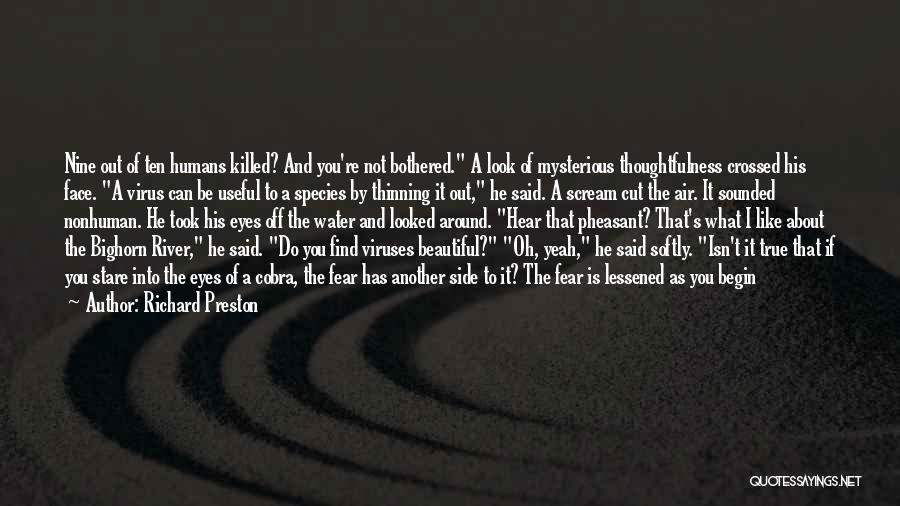
Nine out of ten humans killed? And you're not bothered."
A look of mysterious thoughtfulness crossed his face. "A virus can be useful to a species by thinning it out," he said.
A scream cut the air. It sounded nonhuman.
He took his eyes off the water and looked around. "Hear that pheasant? That's what I like about the Bighorn River," he said.
"Do you find viruses beautiful?"
"Oh, yeah," he said softly. "Isn't it true that if you stare into the eyes of a cobra, the fear has another side to it? The fear is lessened as you begin to see the essence of the beauty. Looking at Ebola under an electron microscope is like looking at a gorgeously wrought ice castle. The thing is so cold. So totally pure." He laid a perfect cast on the water, and eddies took the fly down. (92) — Richard Preston
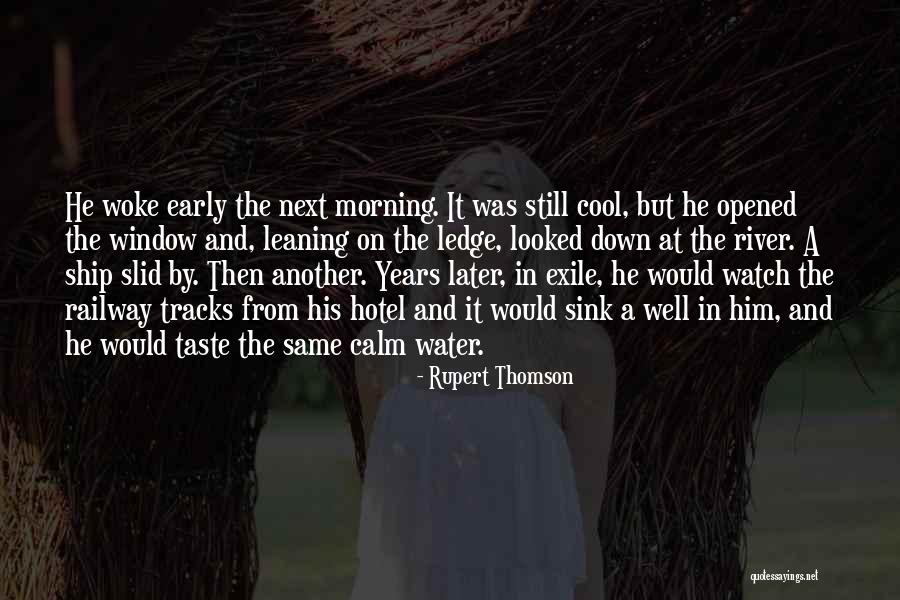
He woke early the next morning. It was still cool, but he opened the window and, leaning on the ledge, looked down at the river. A ship slid by. Then another. Years later, in exile, he would watch the railway tracks from his hotel and it would sink a well in him, and he would taste the same calm water. — Rupert Thomson
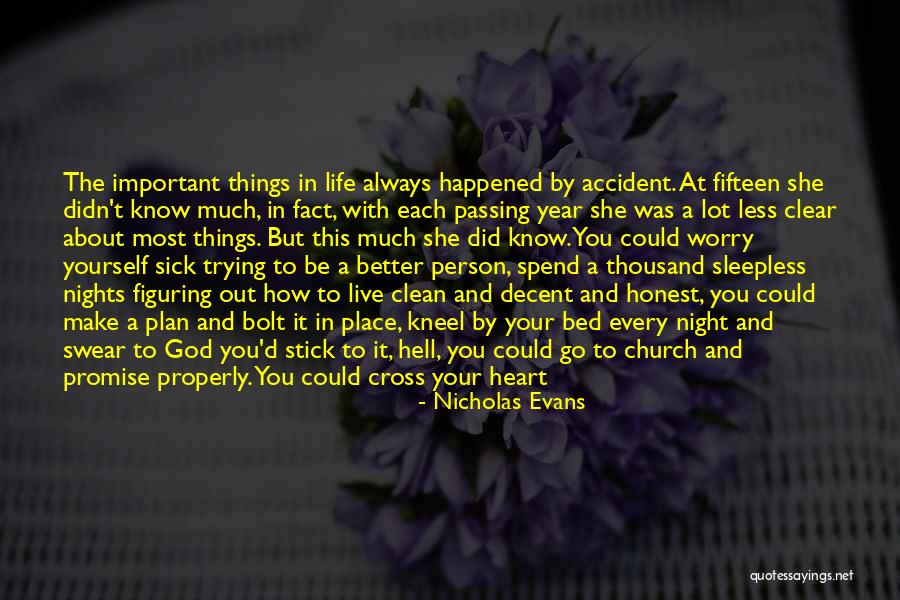
The important things in life always happened by accident. At fifteen she didn't know much, in fact, with each passing year she was a lot less clear about most things. But this much she did know. You could worry yourself sick trying to be a better person, spend a thousand sleepless nights figuring out how to live clean and decent and honest, you could make a plan and bolt it in place, kneel by your bed every night and swear to God you'd stick to it, hell, you could go to church and promise properly. You could cross your heart seven times with your eyes tight shut, cut your thumb and squeeze it and pen solemn vows on a rock with your own blood then throw it in the river at the stroke of midnight. And then, out of the black beyond, like a hawk on a rat, some nameless catastrophe would swoop into your life and turn everything upside down and inside out forever. — Nicholas Evans
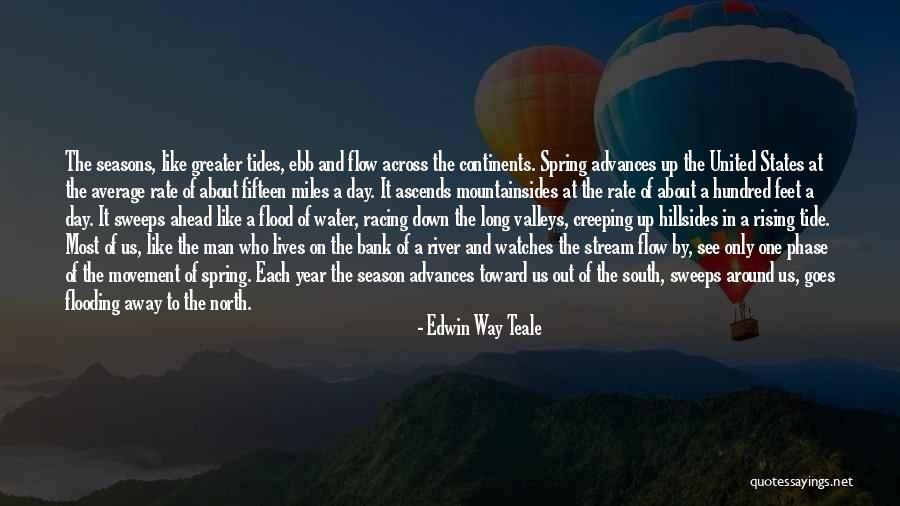
The seasons, like greater tides, ebb and flow across the continents. Spring advances up the United States at the average rate of about fifteen miles a day. It ascends mountainsides at the rate of about a hundred feet a day. It sweeps ahead like a flood of water, racing down the long valleys, creeping up hillsides in a rising tide. Most of us, like the man who lives on the bank of a river and watches the stream flow by, see only one phase of the movement of spring. Each year the season advances toward us out of the south, sweeps around us, goes flooding away to the north. — Edwin Way Teale
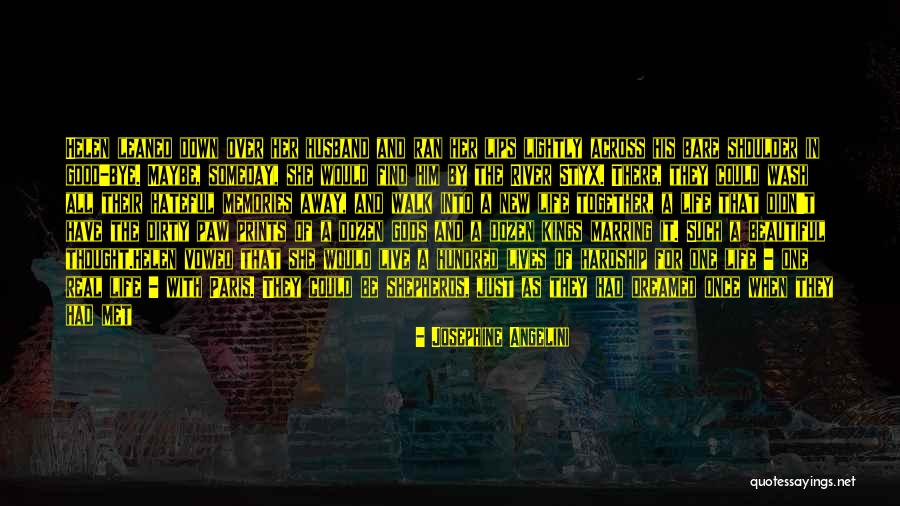
Helen leaned down over her husband and ran her lips lightly across his bare shoulder in good-bye. Maybe, someday, she would find him by the River Styx. There, they could wash all their hateful memories away, and walk into a new life together, a life that didn't have the dirty paw prints of a dozen gods and a dozen kings marring it. Such a beautiful thought.
Helen vowed that she would live a hundred lives of hardship for one life - one real life - with Paris. They could be shepherds, just as they had dreamed once when they had met at the great lighthouse long ago. She'd be anything, really, a shopkeeper, or a farmer, whatever, as long as they were allowed to live their lives and each other freely. She dressed quickly, imagining herself tending a shop somewhere by the sea, hoping that someday this dream would come true. — Josephine Angelini
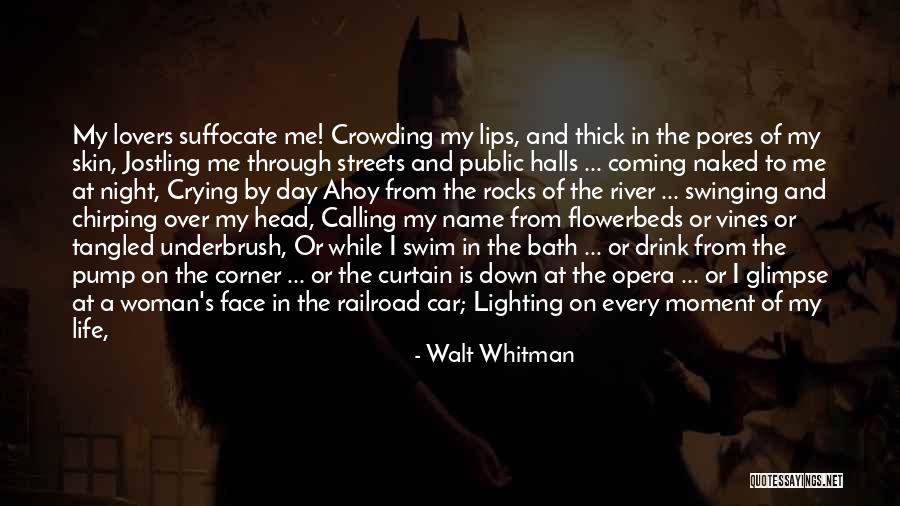
My lovers suffocate me! Crowding my lips, and thick in the pores of my skin, Jostling me through streets and public halls ... coming naked to me at night, Crying by day Ahoy from the rocks of the river ... swinging and chirping over my head, Calling my name from flowerbeds or vines or tangled underbrush, Or while I swim in the bath ... or drink from the pump on the corner ... or the curtain is down at the opera ... or I glimpse at a woman's face in the railroad car; Lighting on every moment of my life, Bussing my body with soft and balsamic busses, Noiselessly passing handfuls out of their hearts and giving them to be mine — Walt Whitman
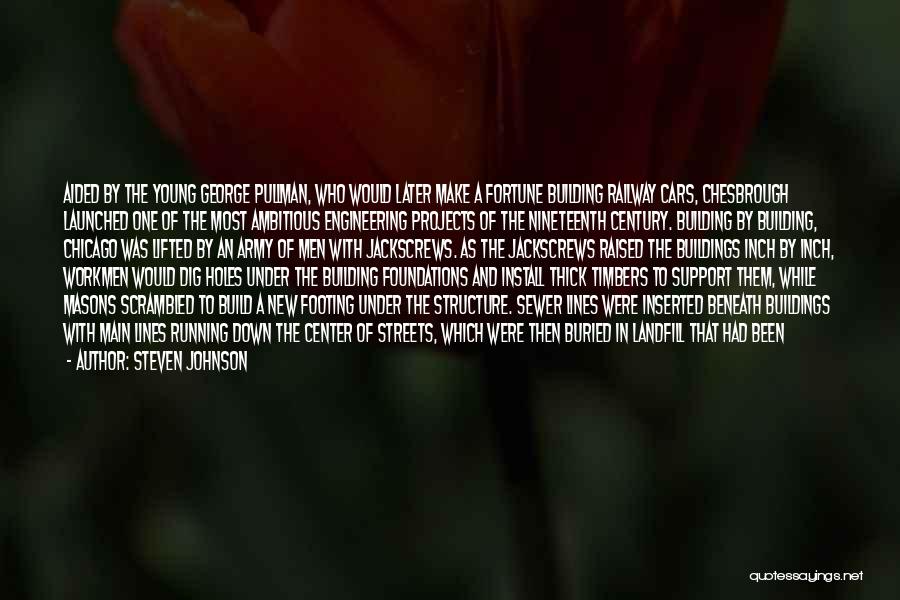
Aided by the young George Pullman, who would later make a fortune building railway cars, Chesbrough launched one of the most ambitious engineering projects of the nineteenth century. Building by building, Chicago was lifted by an army of men with jackscrews. As the jackscrews raised the buildings inch by inch, workmen would dig holes under the building foundations and install thick timbers to support them, while masons scrambled to build a new footing under the structure. Sewer lines were inserted beneath buildings with main lines running down the center of streets, which were then buried in landfill that had been dredged out of the Chicago River, raising the entire city almost ten feet on average. Tourists walking around downtown Chicago today regularly marvel at the engineering prowess on display in the city's spectacular skyline; what they don't realize is that the ground beneath their feet is also the product of brilliant engineering. — Steven Johnson
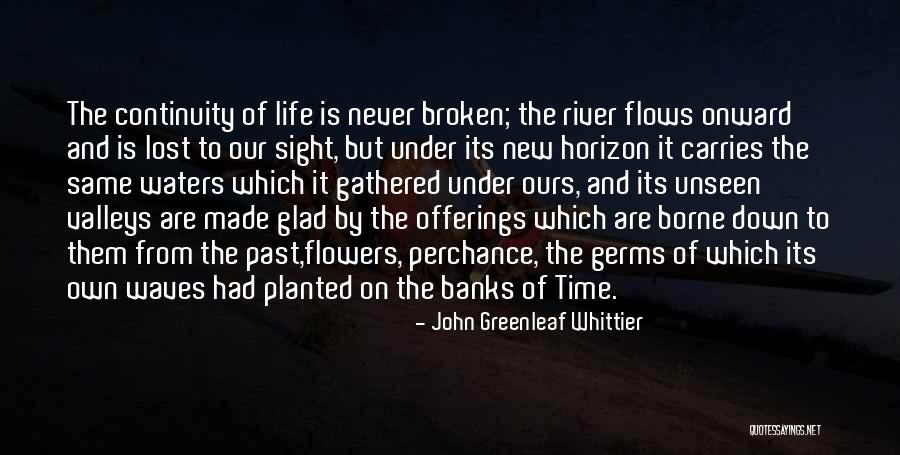
The continuity of life is never broken; the river flows onward and is lost to our sight, but under its new horizon it carries the same waters which it gathered under ours, and its unseen valleys are made glad by the offerings which are borne down to them from the past,
flowers, perchance, the germs of which its own waves had planted on the banks of Time. — John Greenleaf Whittier
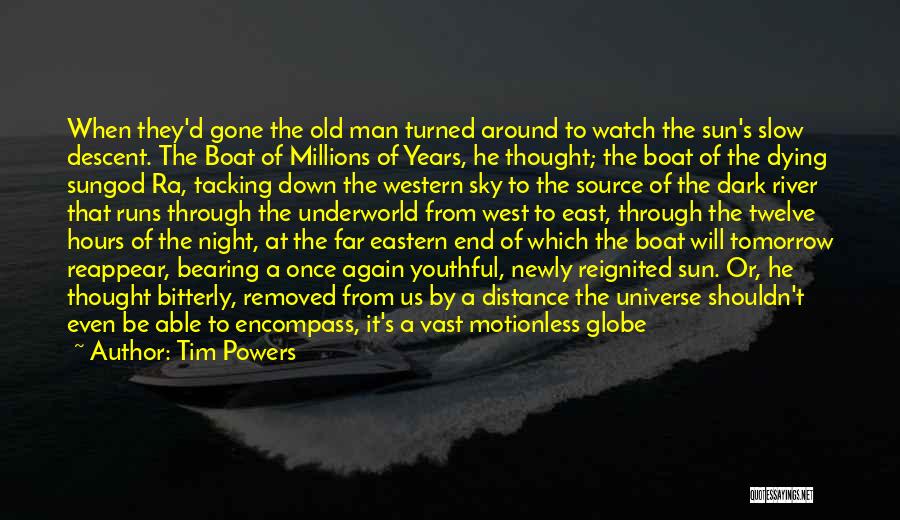
When they'd gone the old man turned around to watch the sun's slow descent. The Boat of Millions of Years, he thought; the boat of the dying sungod Ra, tacking down the western sky to the source of the dark river that runs through the underworld from west to east, through the twelve hours of the night, at the far eastern end of which the boat will tomorrow reappear, bearing a once again youthful, newly reignited sun.
Or, he thought bitterly, removed from us by a distance the universe shouldn't even be able to encompass, it's a vast motionless globe of burning gas, around which this little ball of a planet rolls like a pellet of dung propelled by a kephera beetle.
Take your pick, he told himself as he started slowly down the hill ... But be willing to die for your choice. — Tim Powers
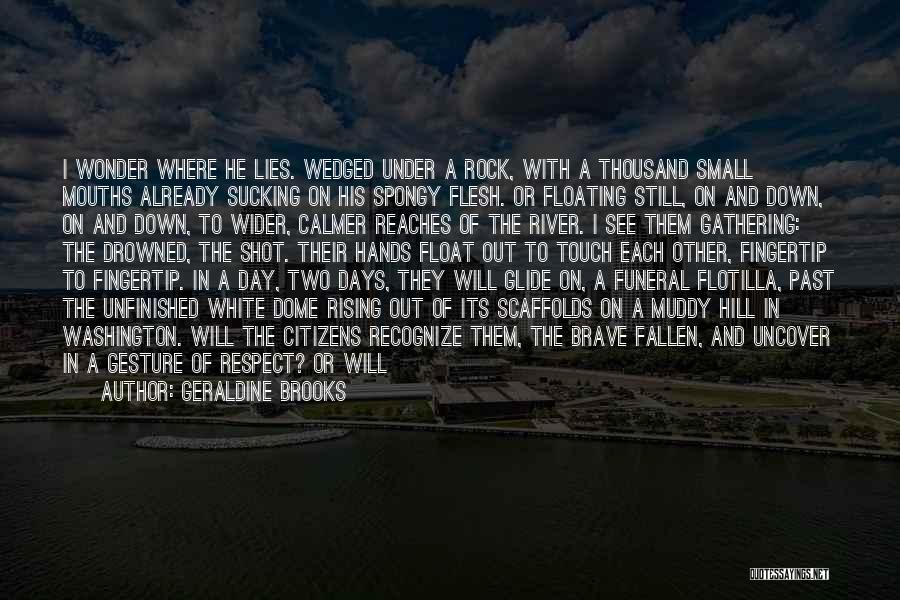
I wonder where he lies. Wedged under a rock, with a thousand small mouths already sucking on his spongy flesh. Or floating still, on and down, on and down, to wider, calmer reaches of the river. I see them gathering: the drowned, the shot. Their hands float out to touch each other, fingertip to fingertip. In a day, two days, they will glide on, a funeral flotilla, past the unfinished white dome rising out of its scaffolds on a muddy hill in Washington. Will the citizens recognize them, the brave fallen, and uncover in a gesture of respect? Or will they turn away, disgusted by the bloated mass of human rot? — Geraldine Brooks






